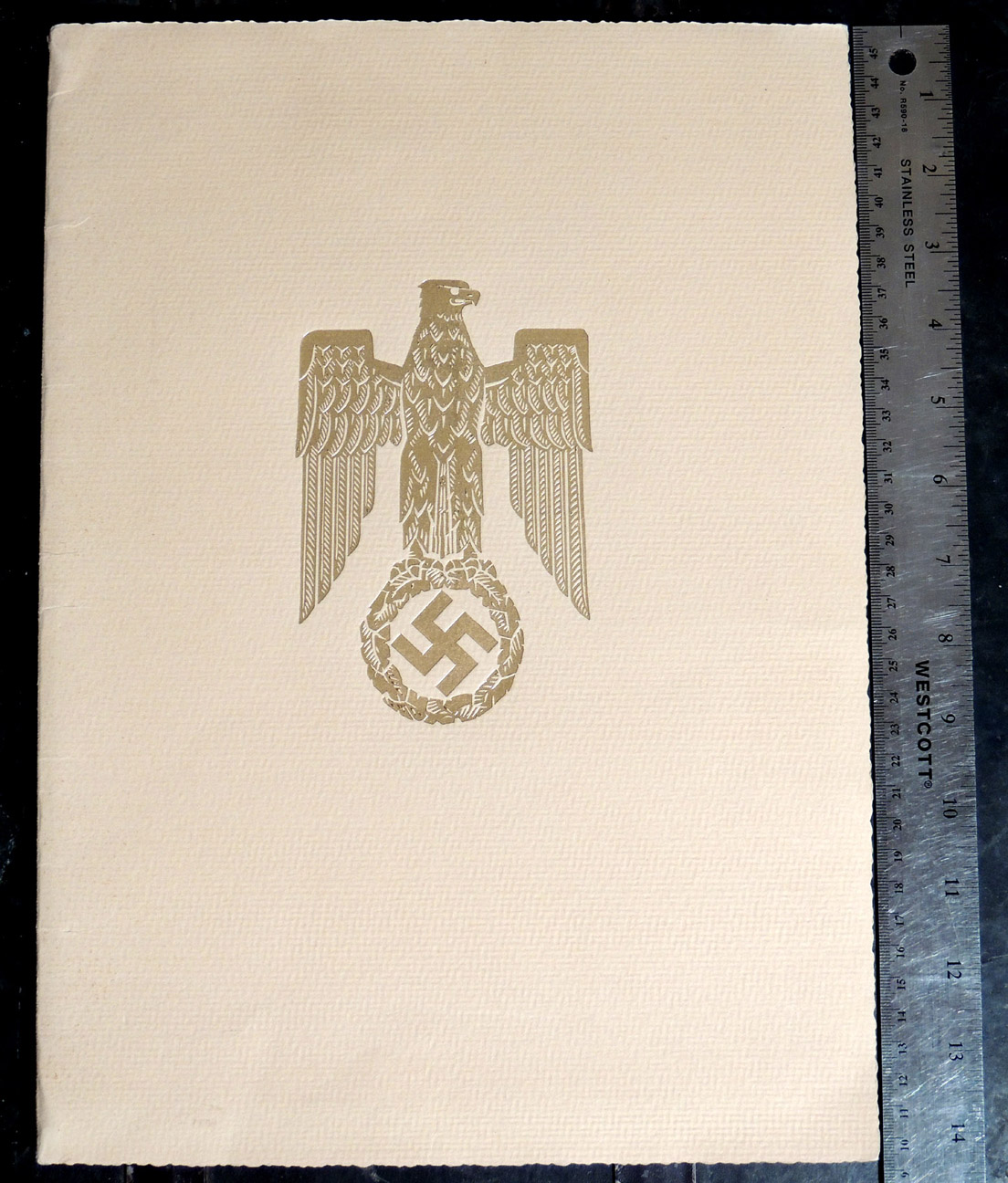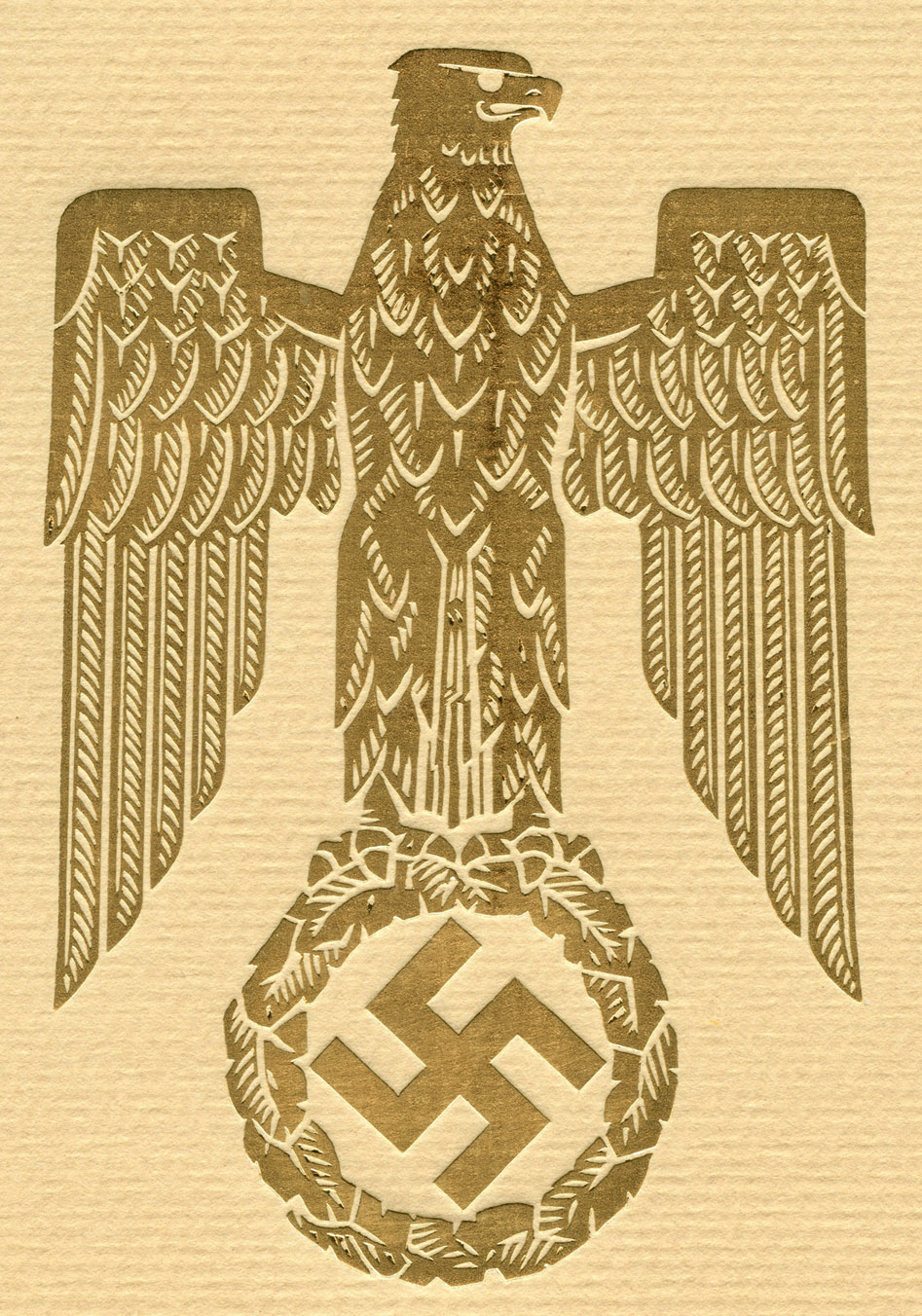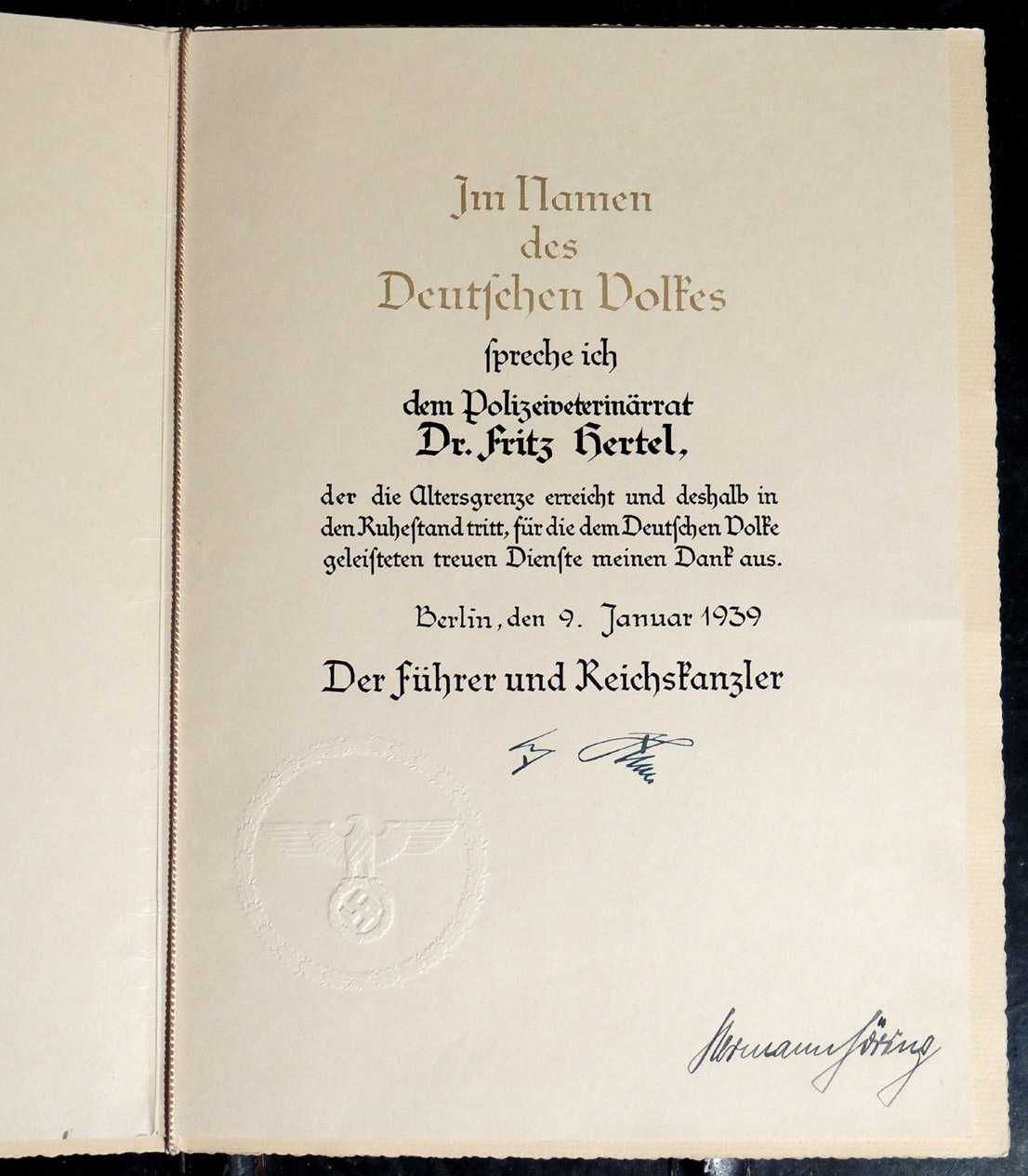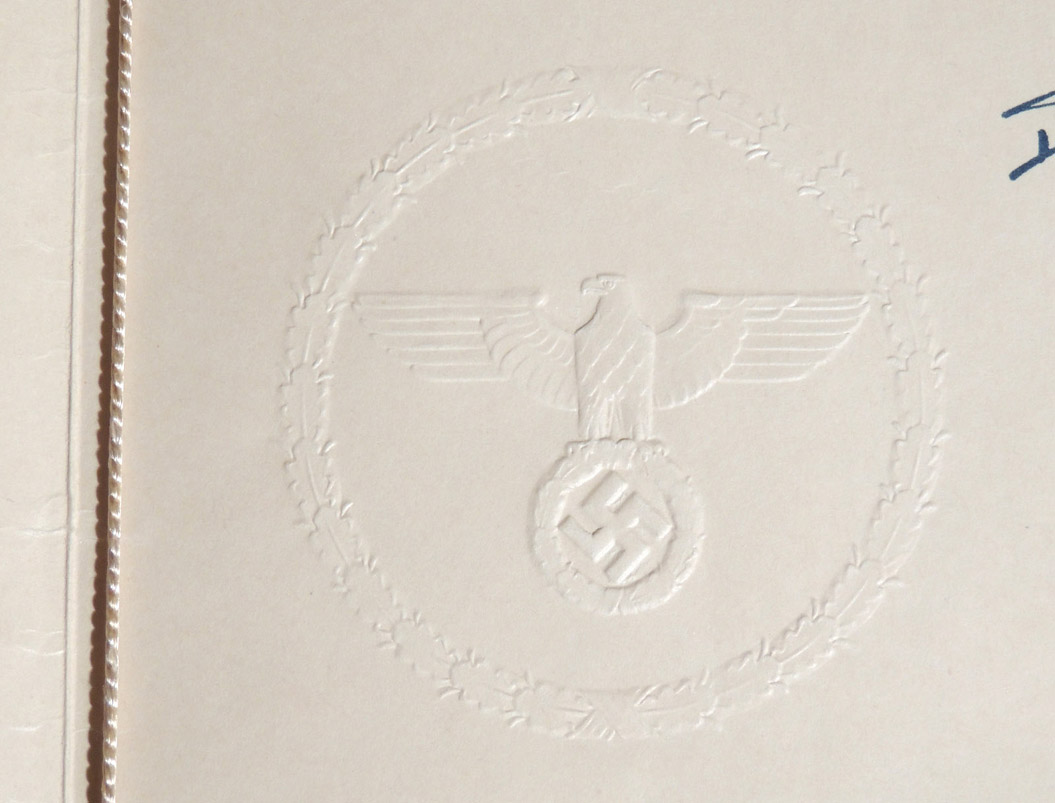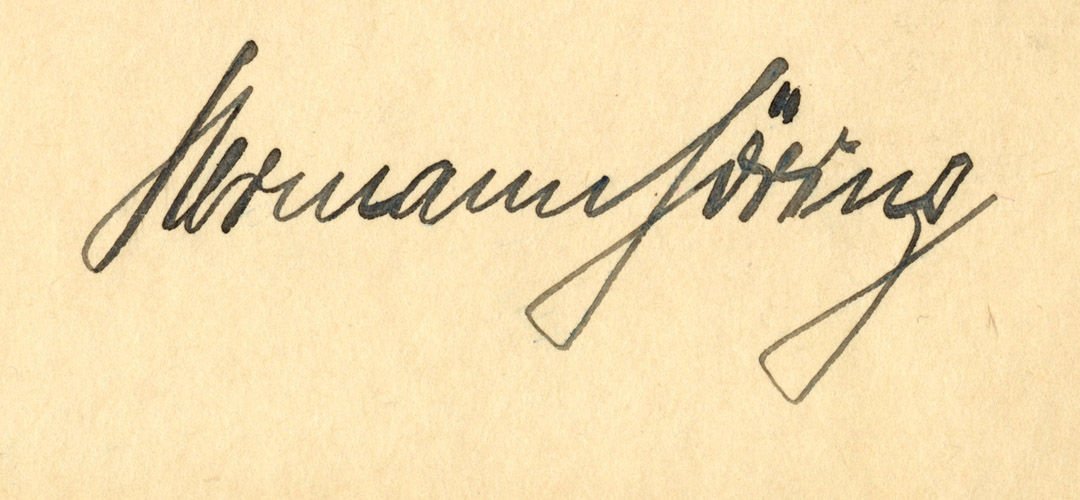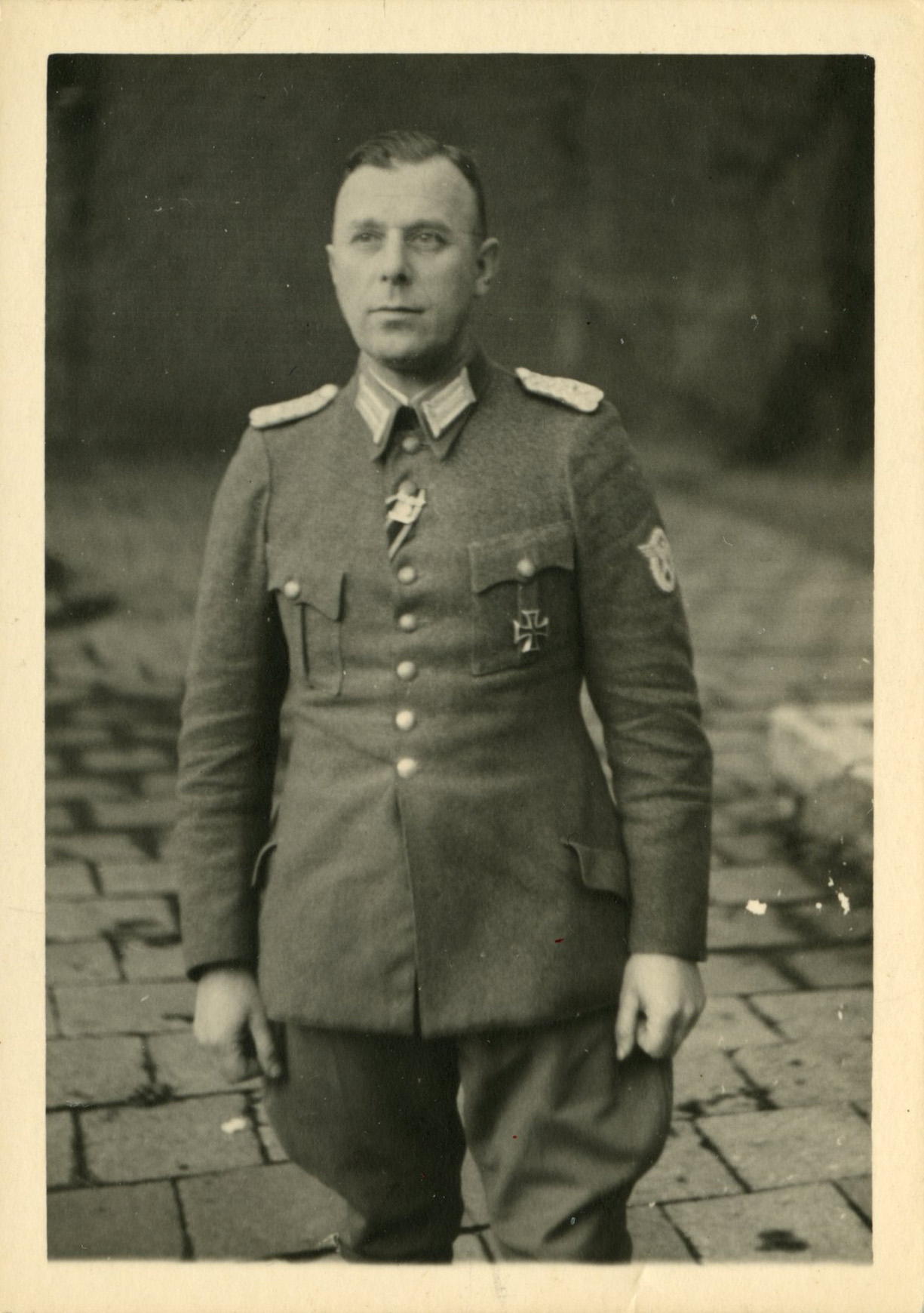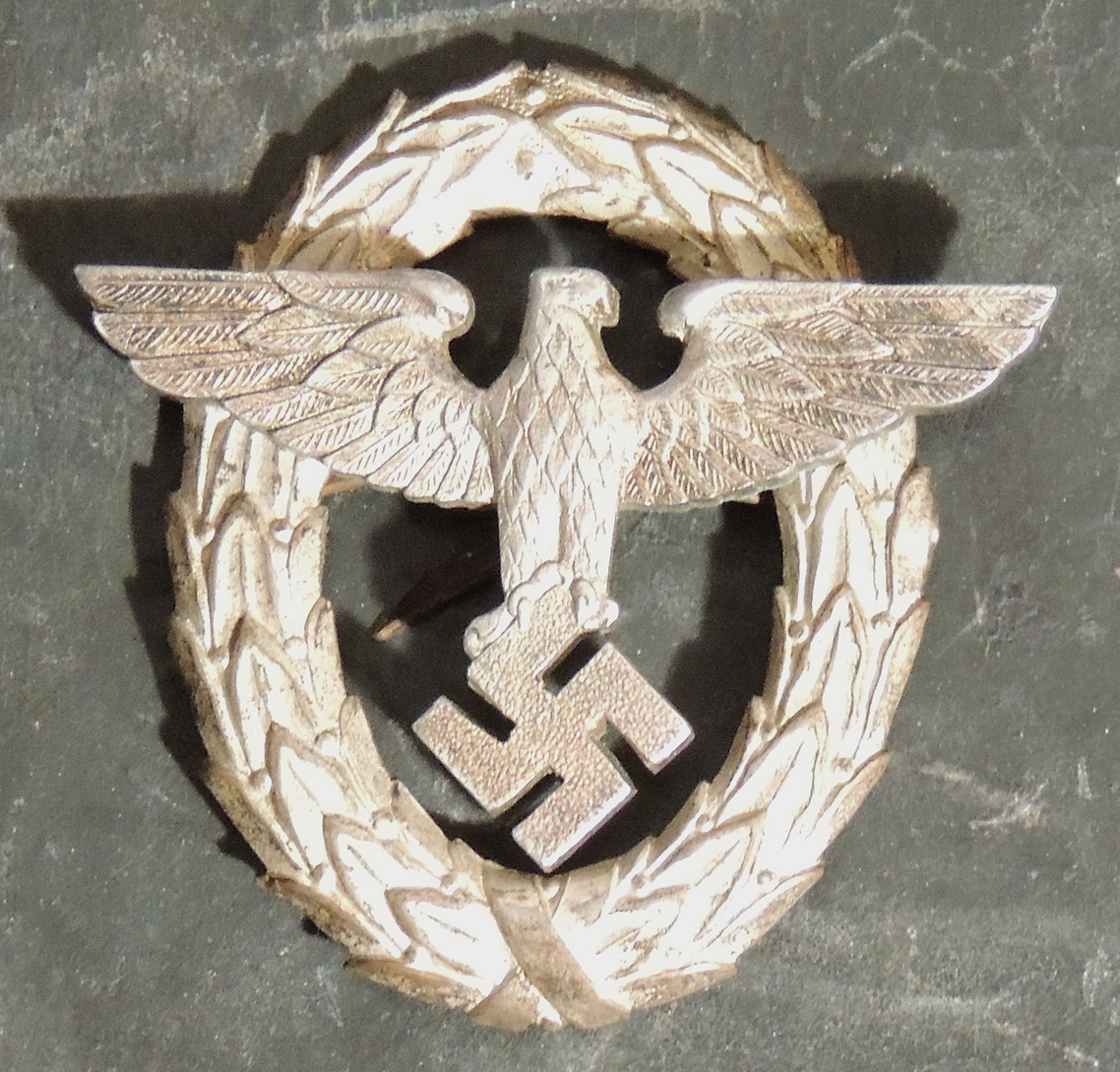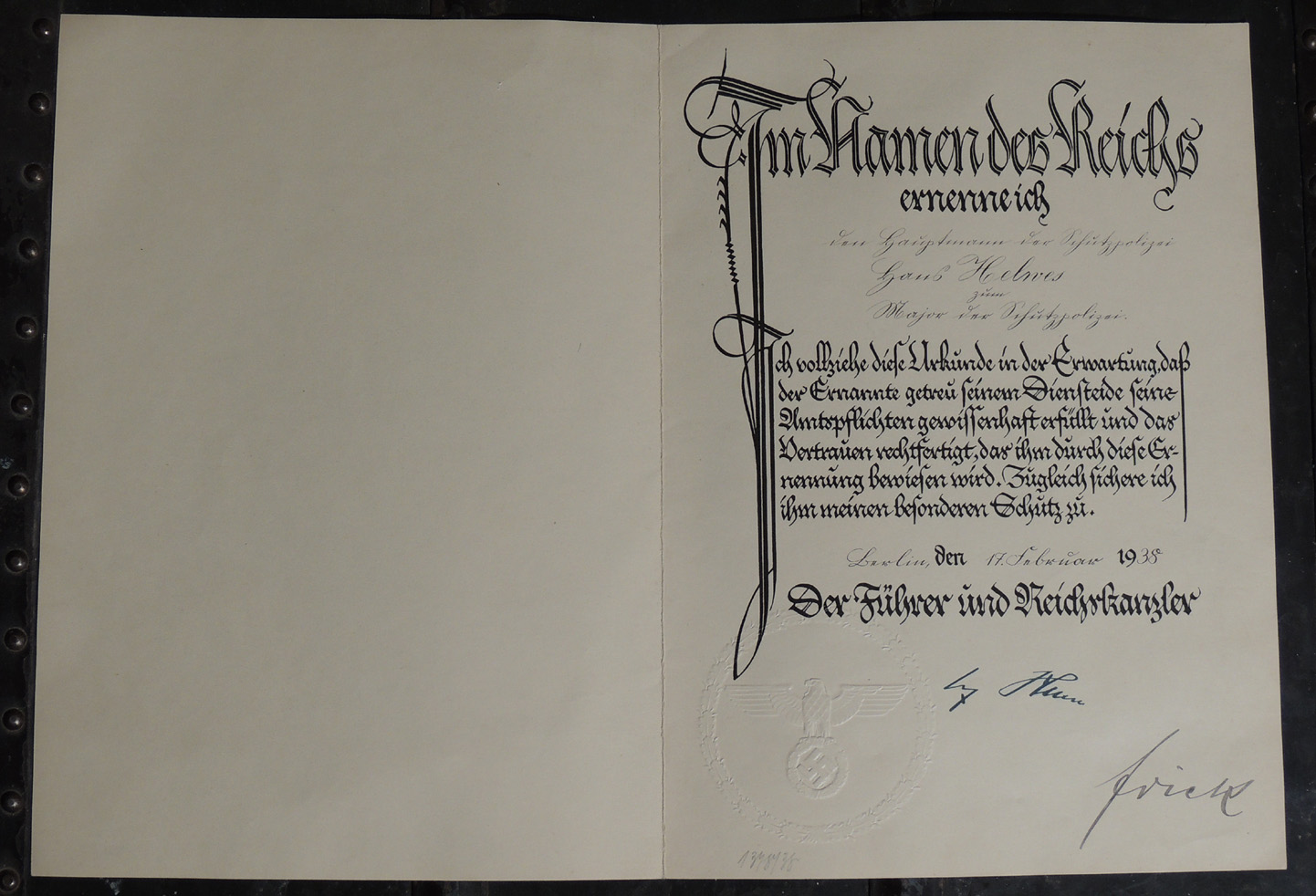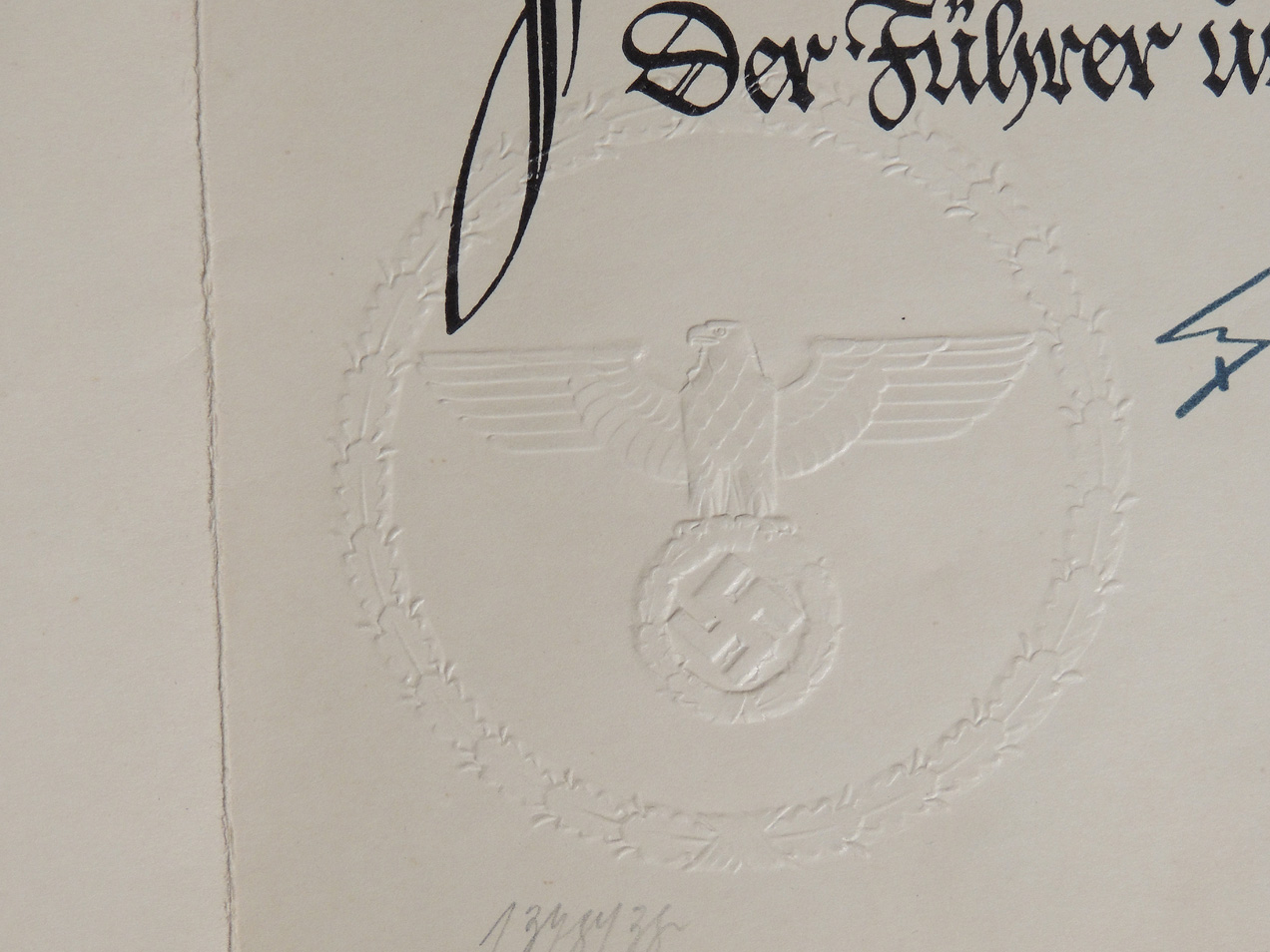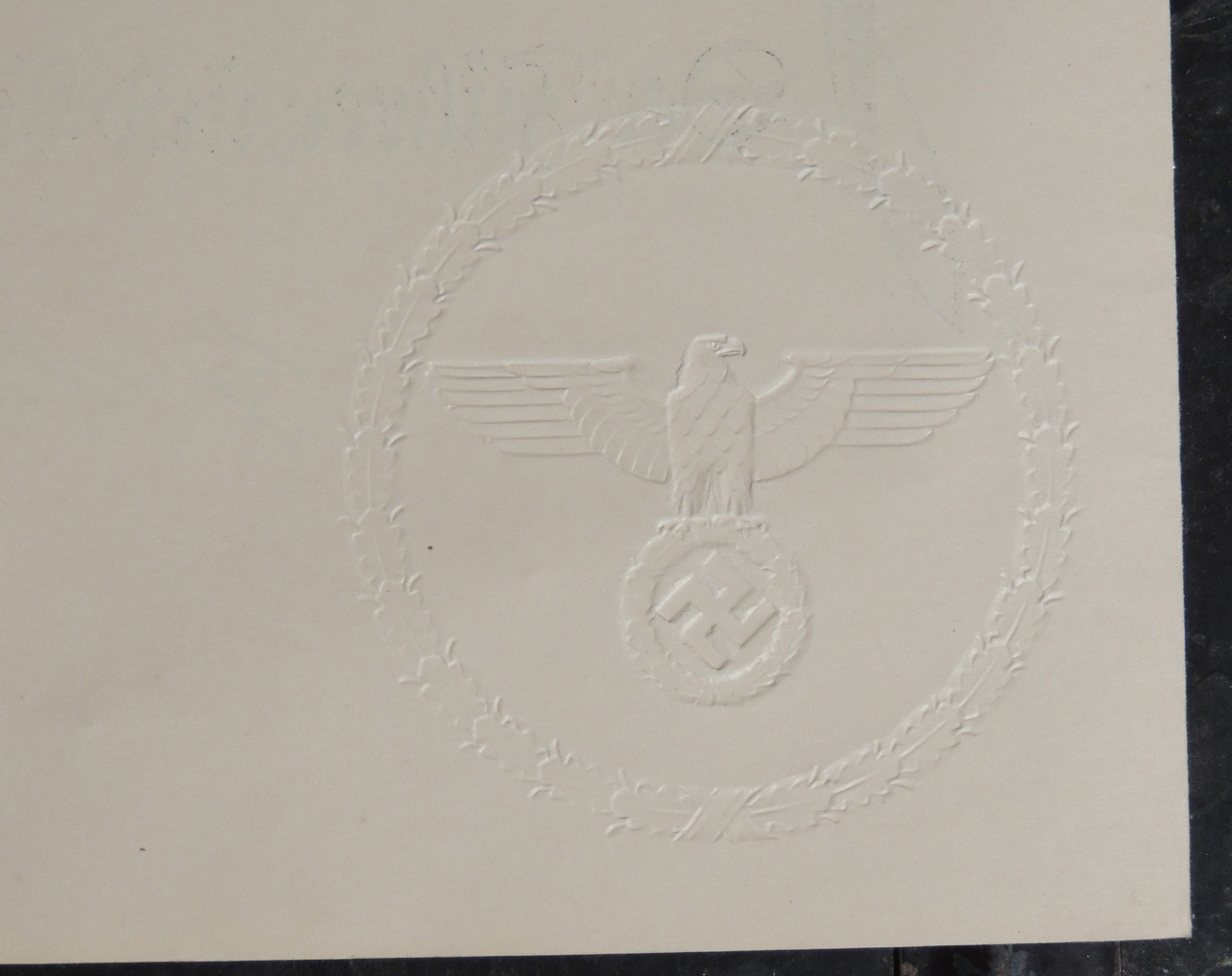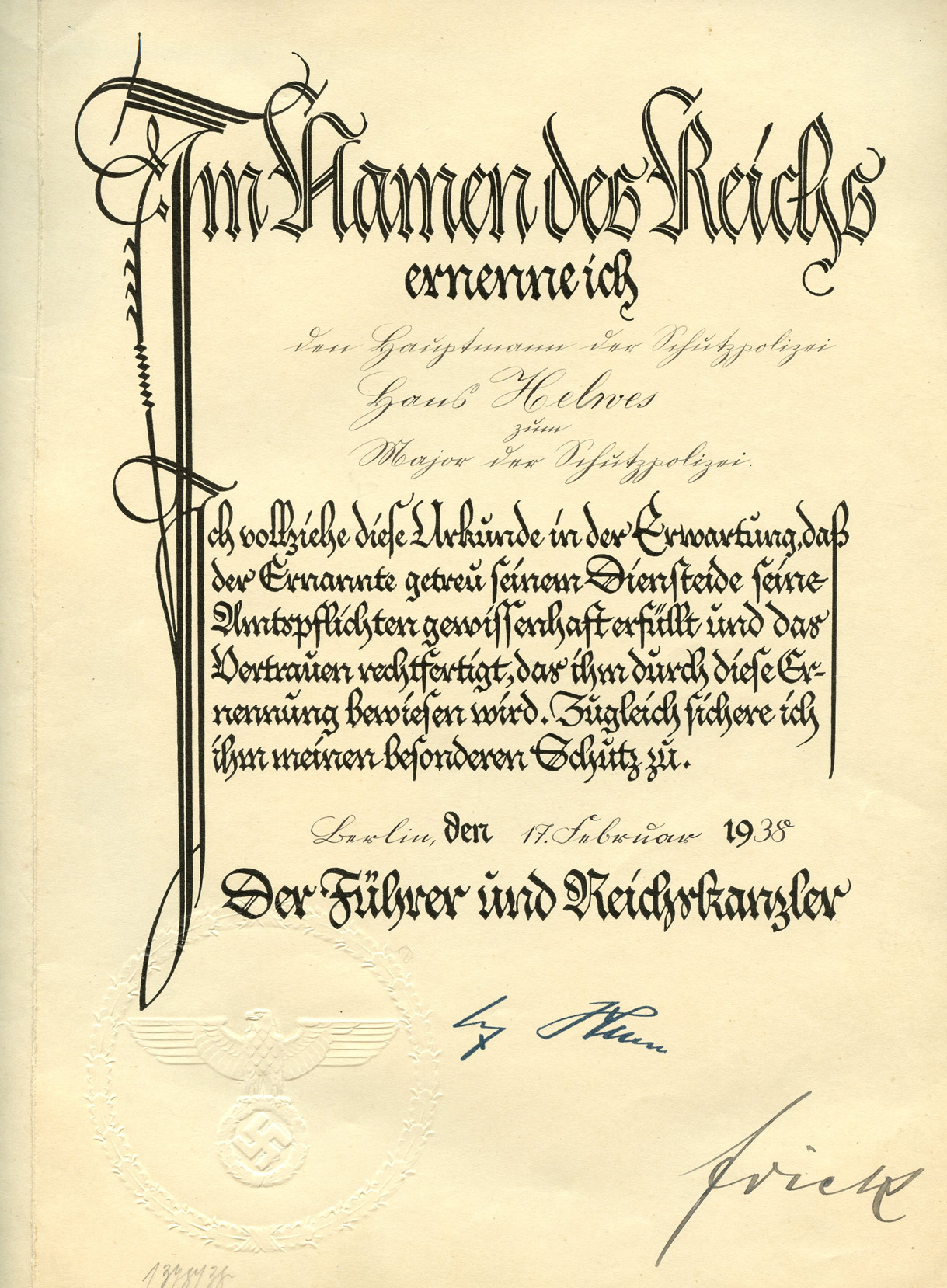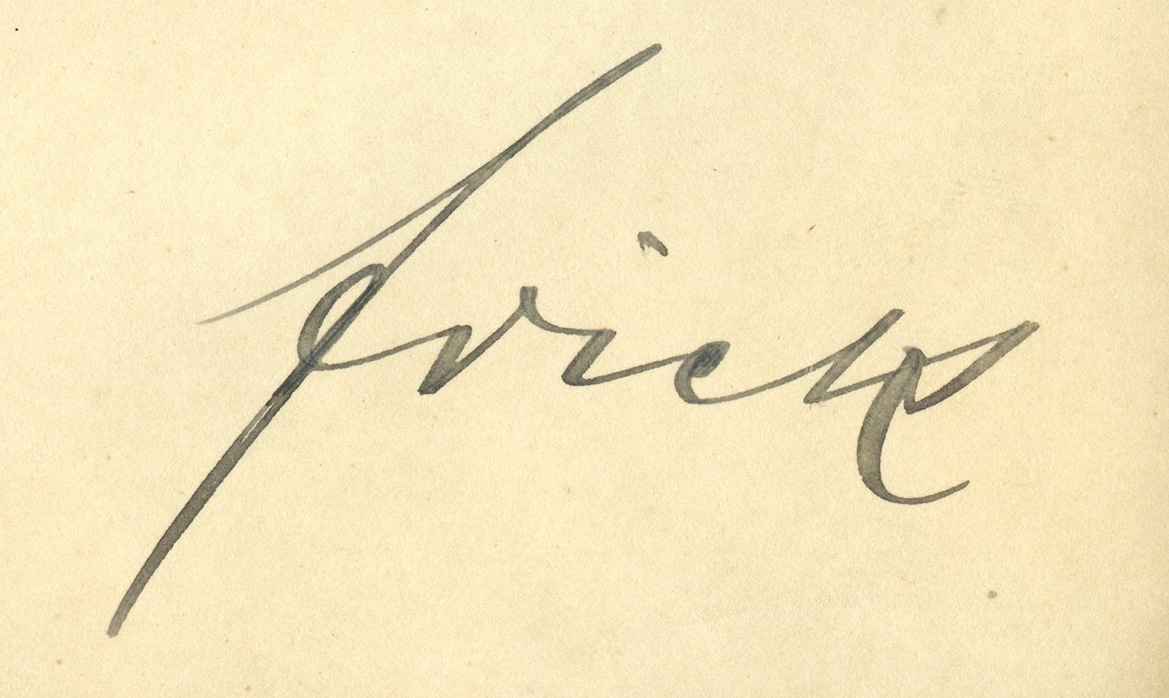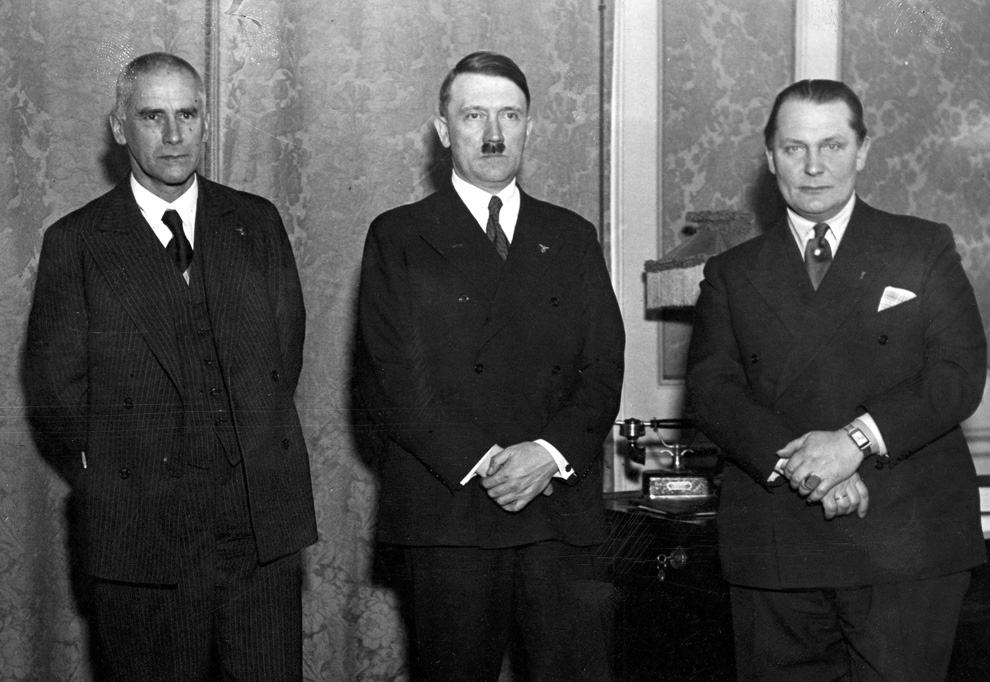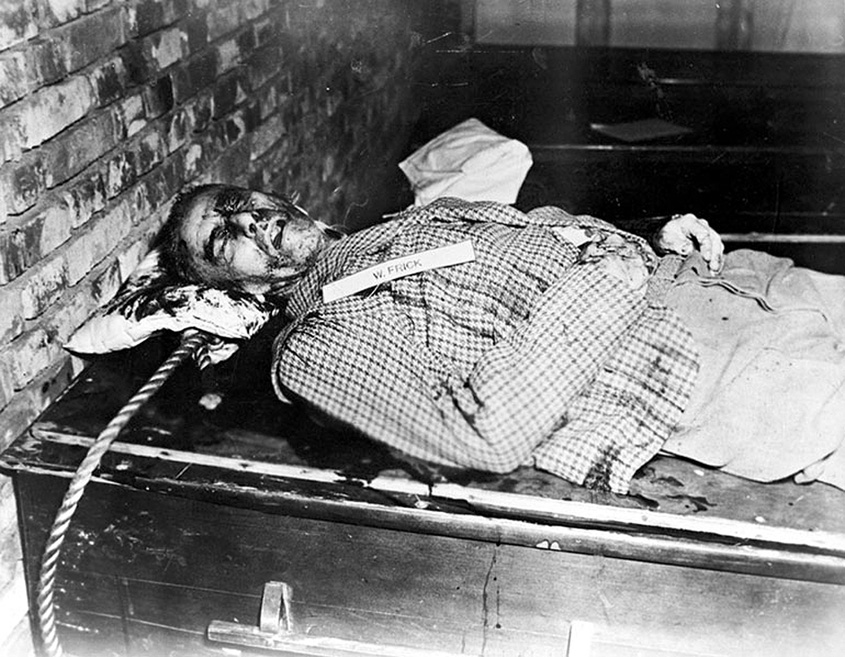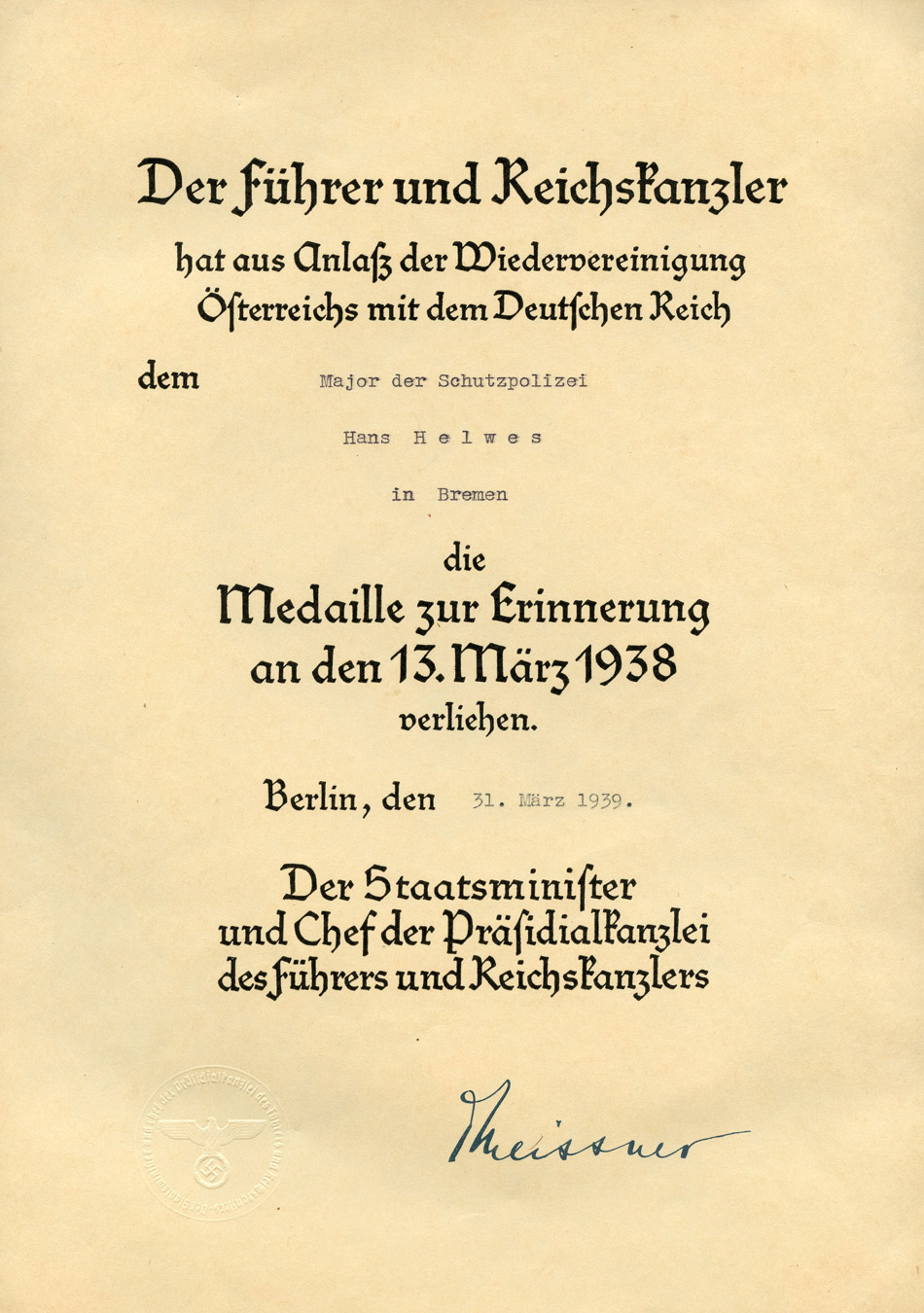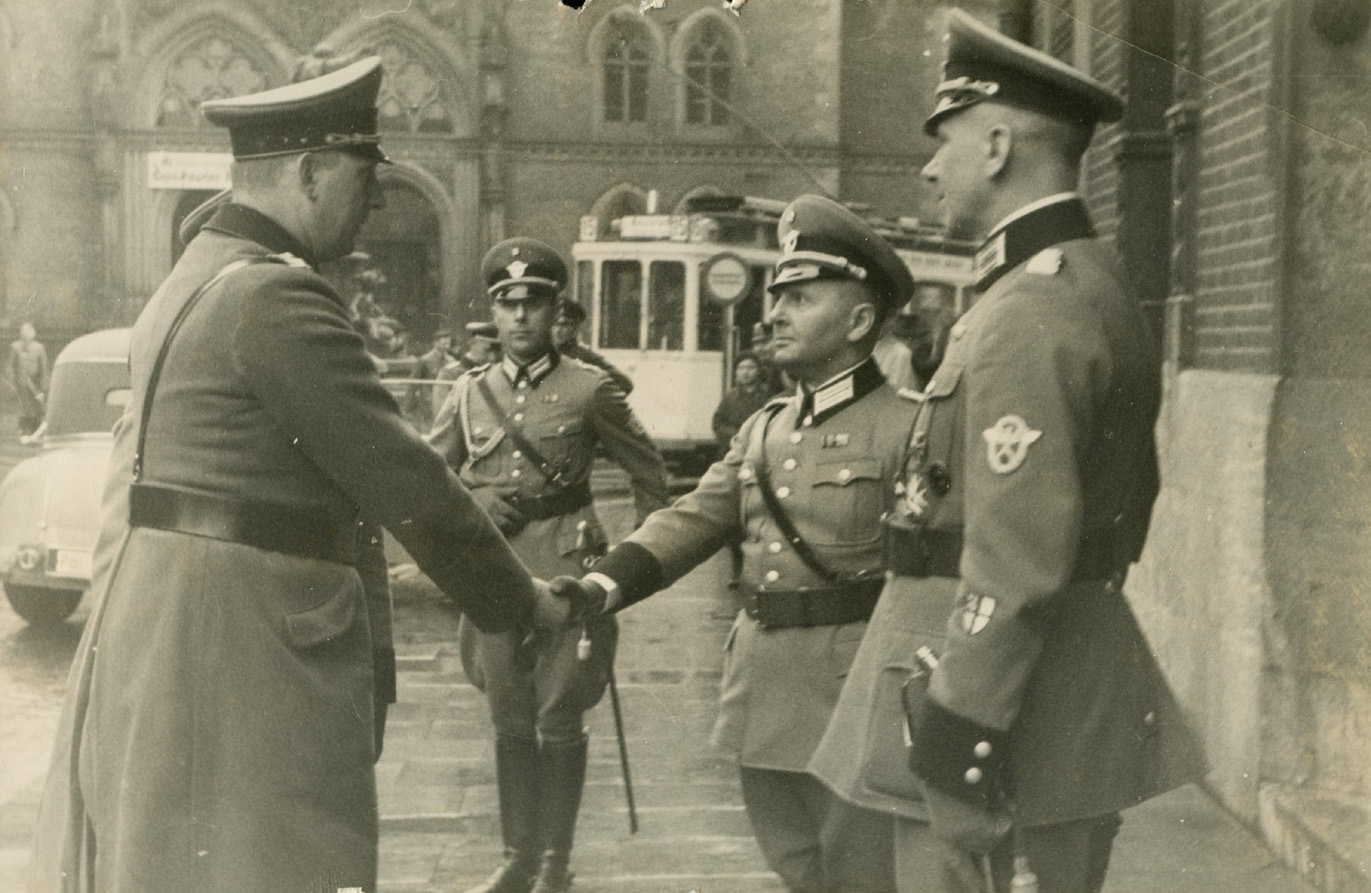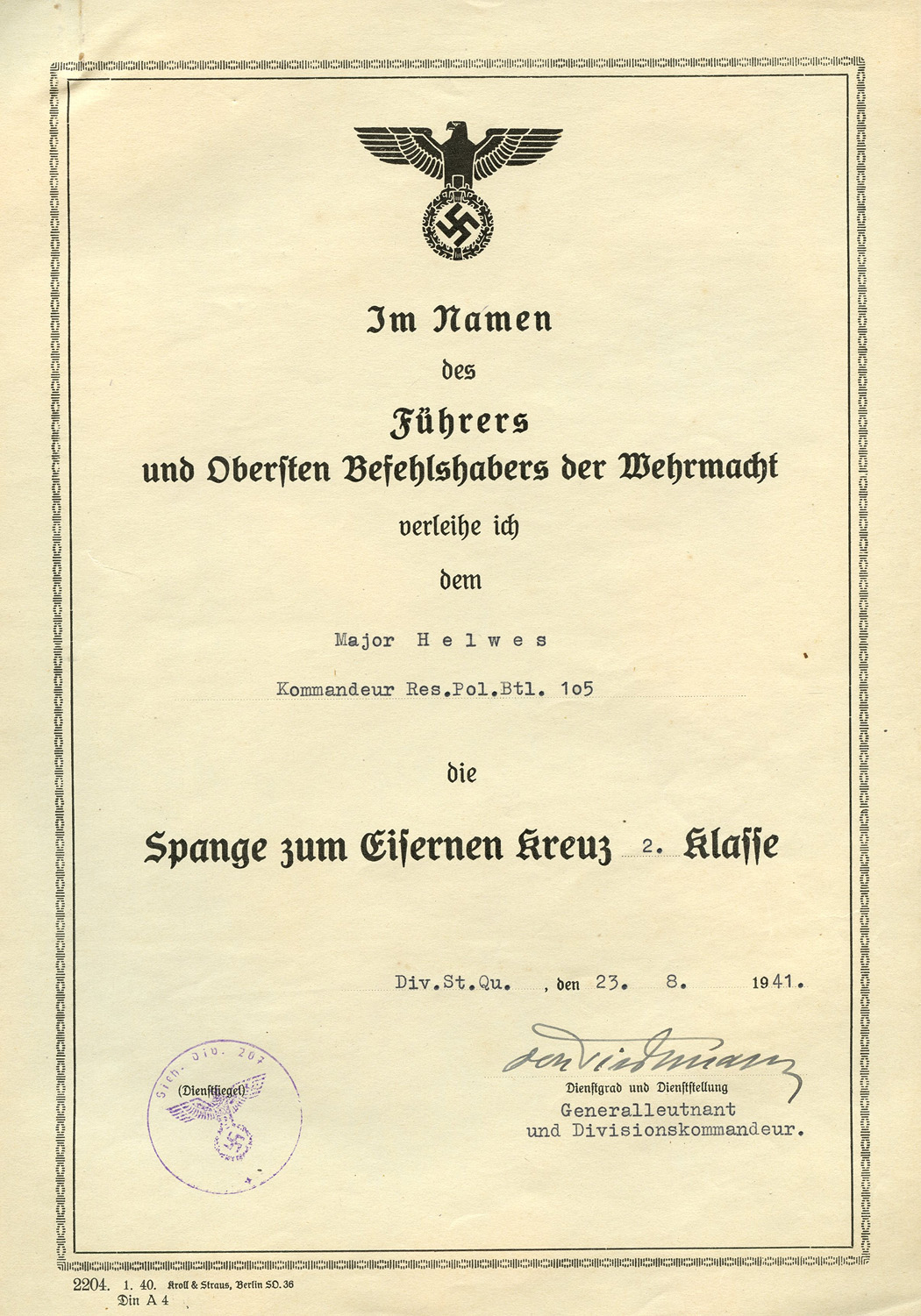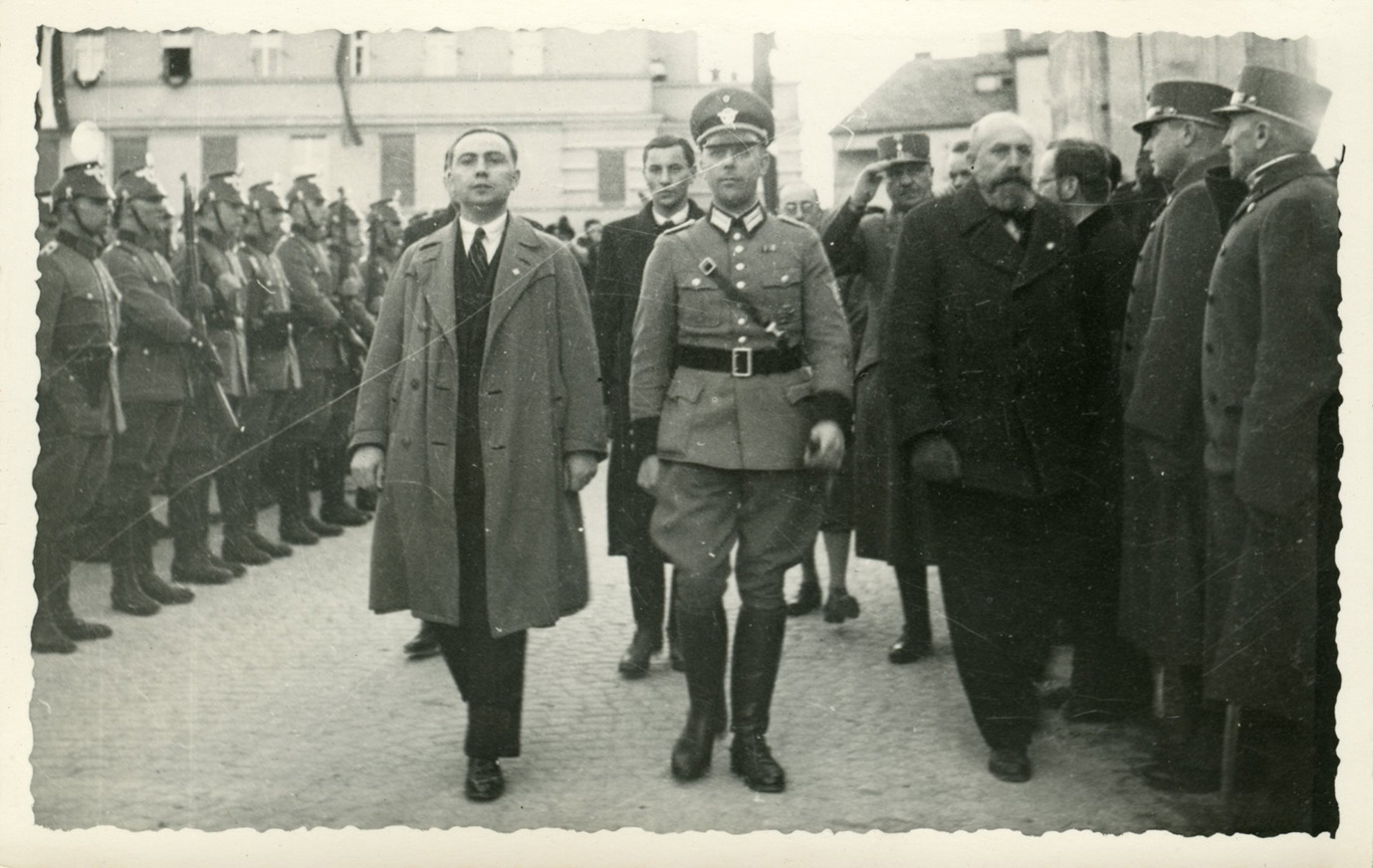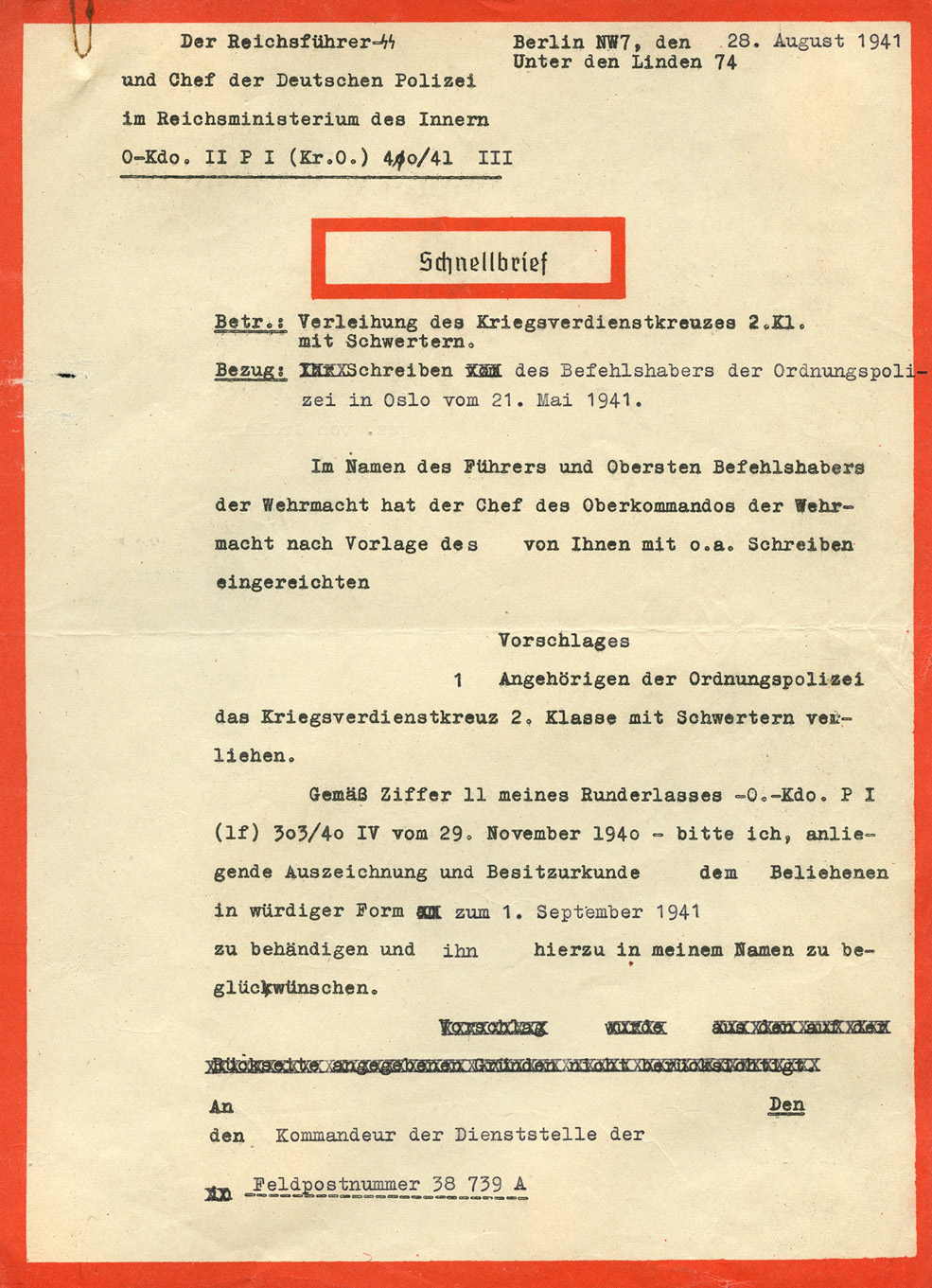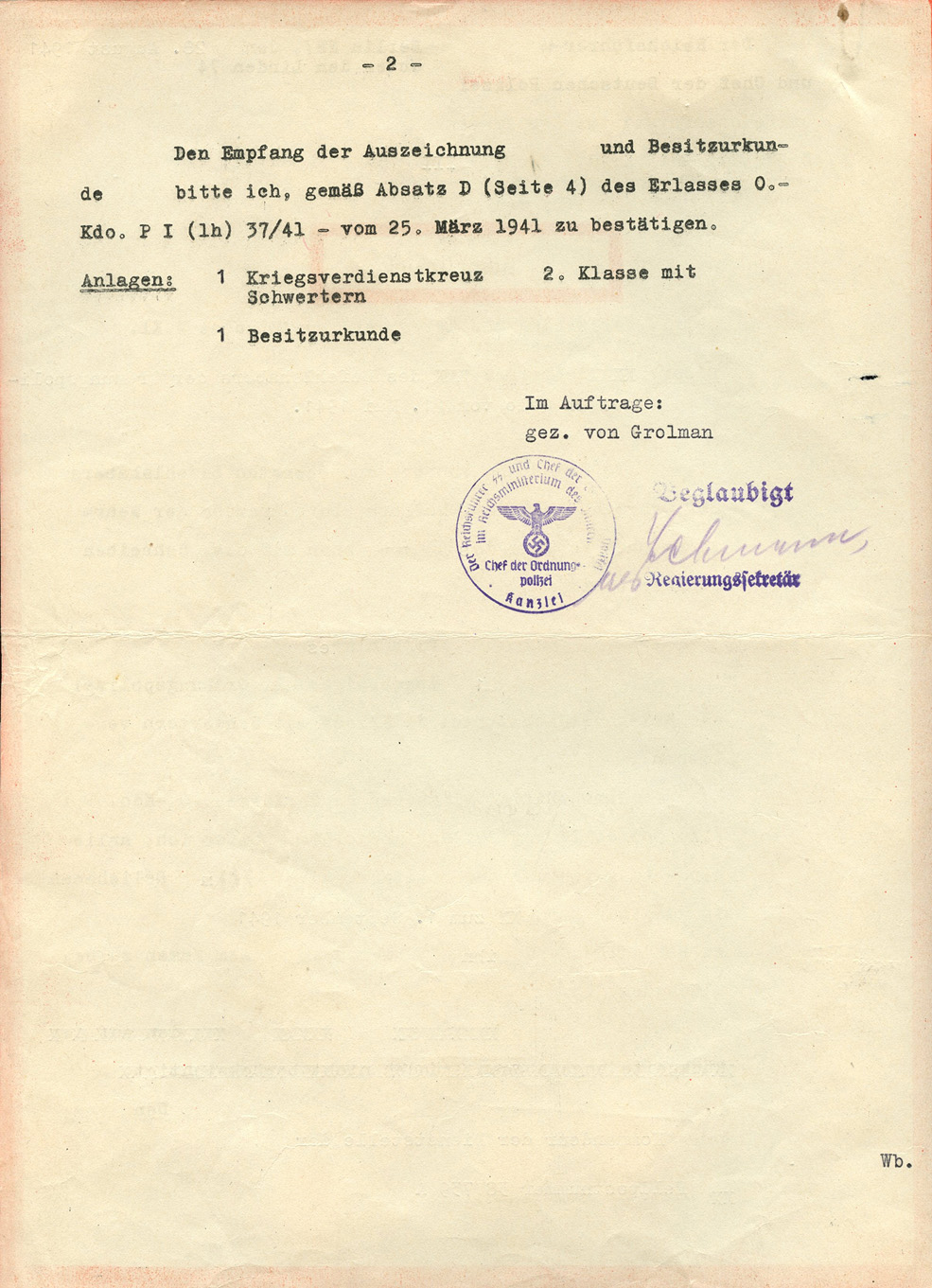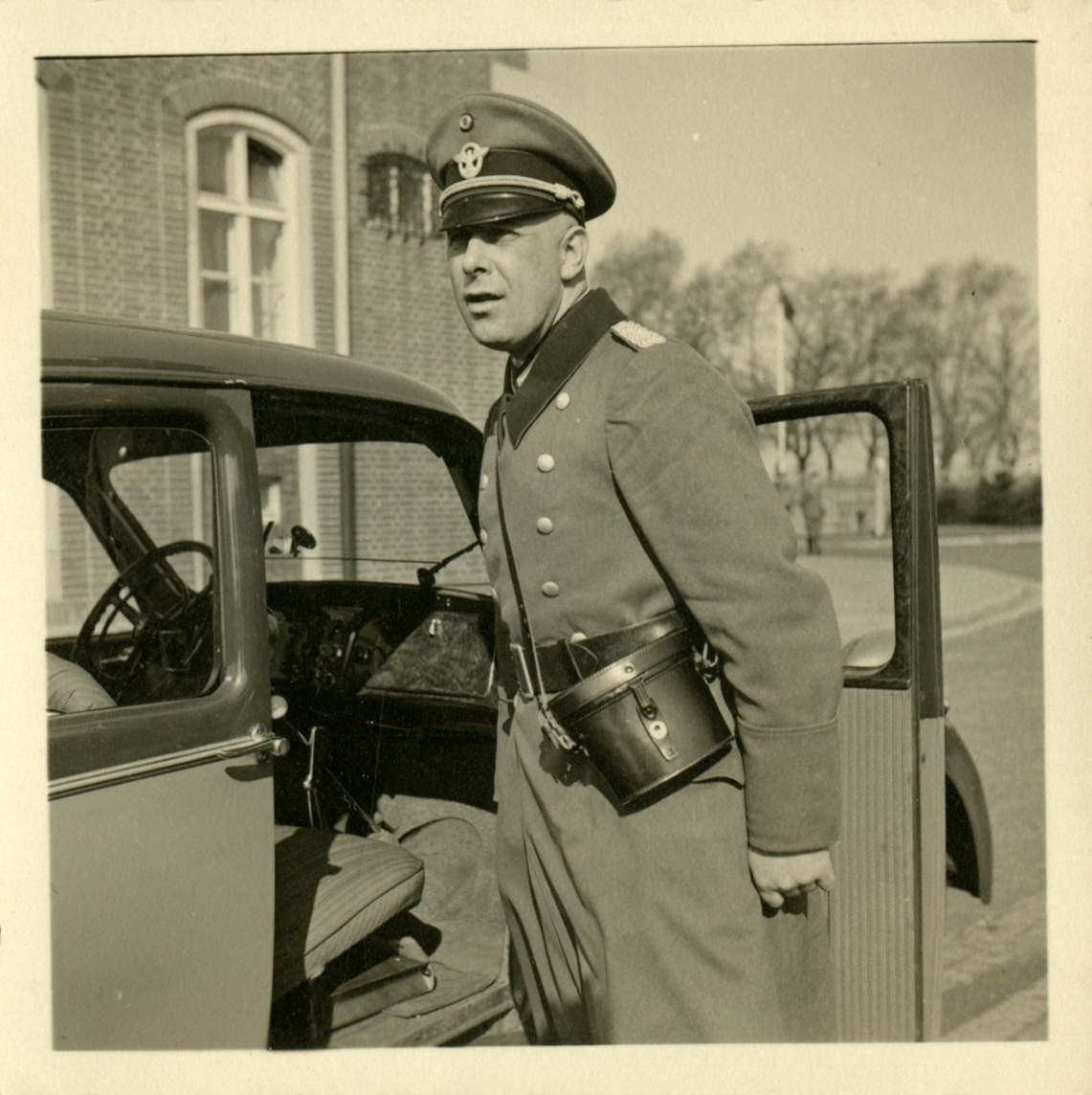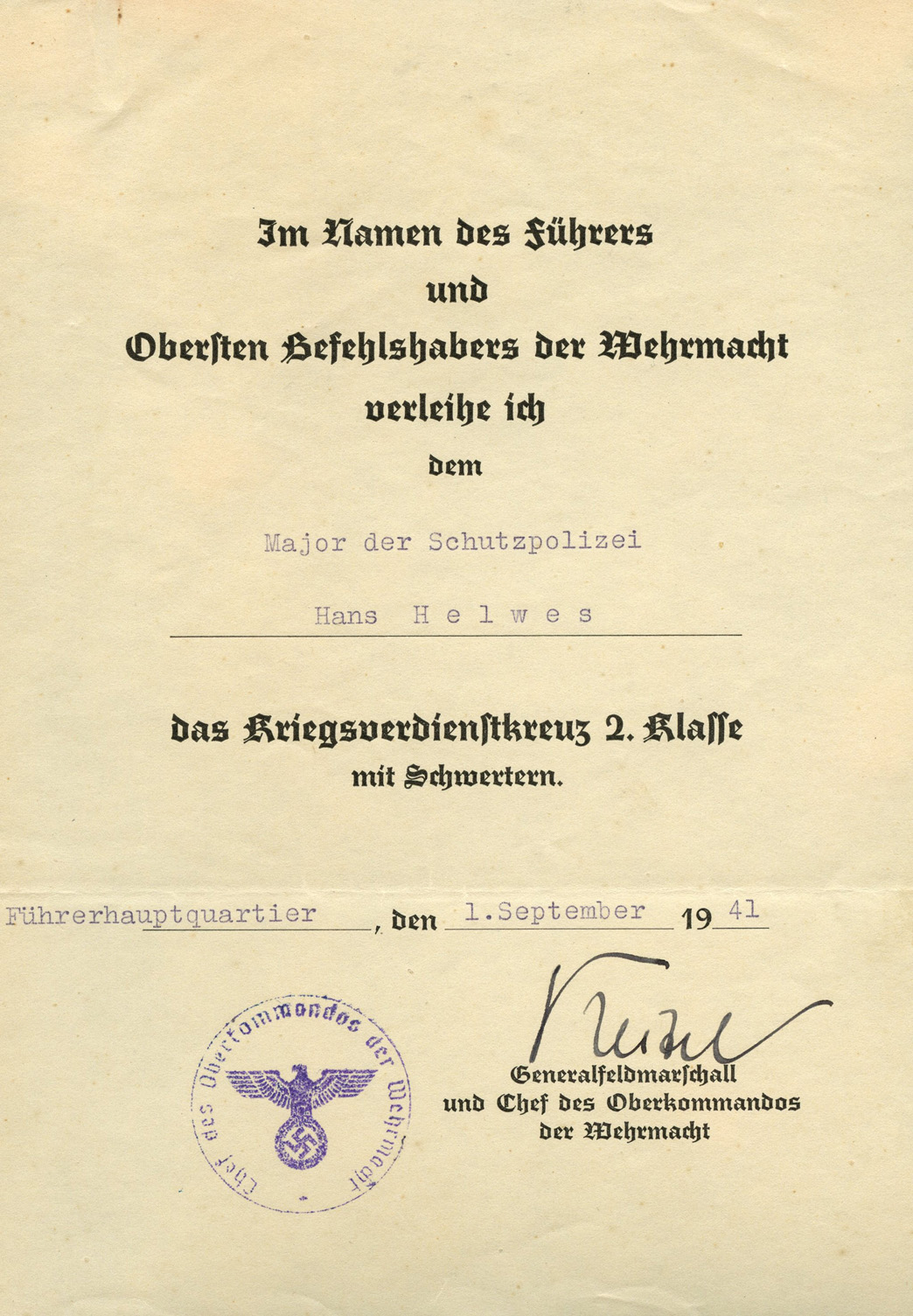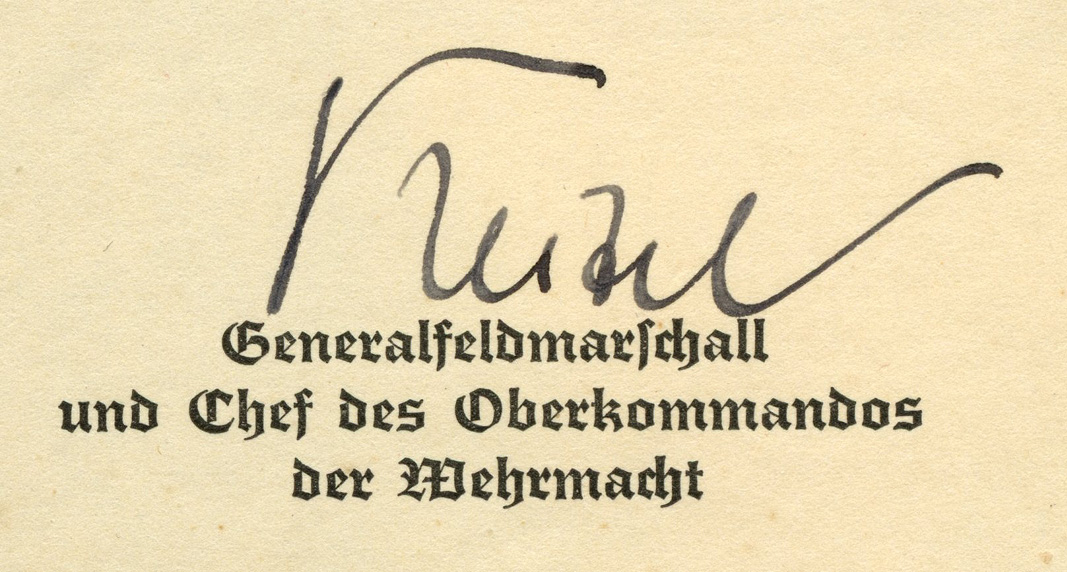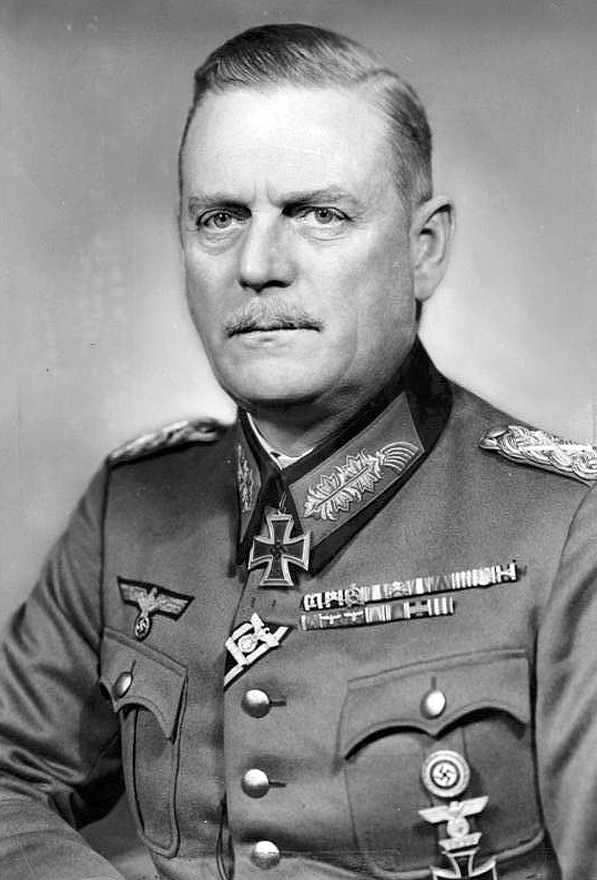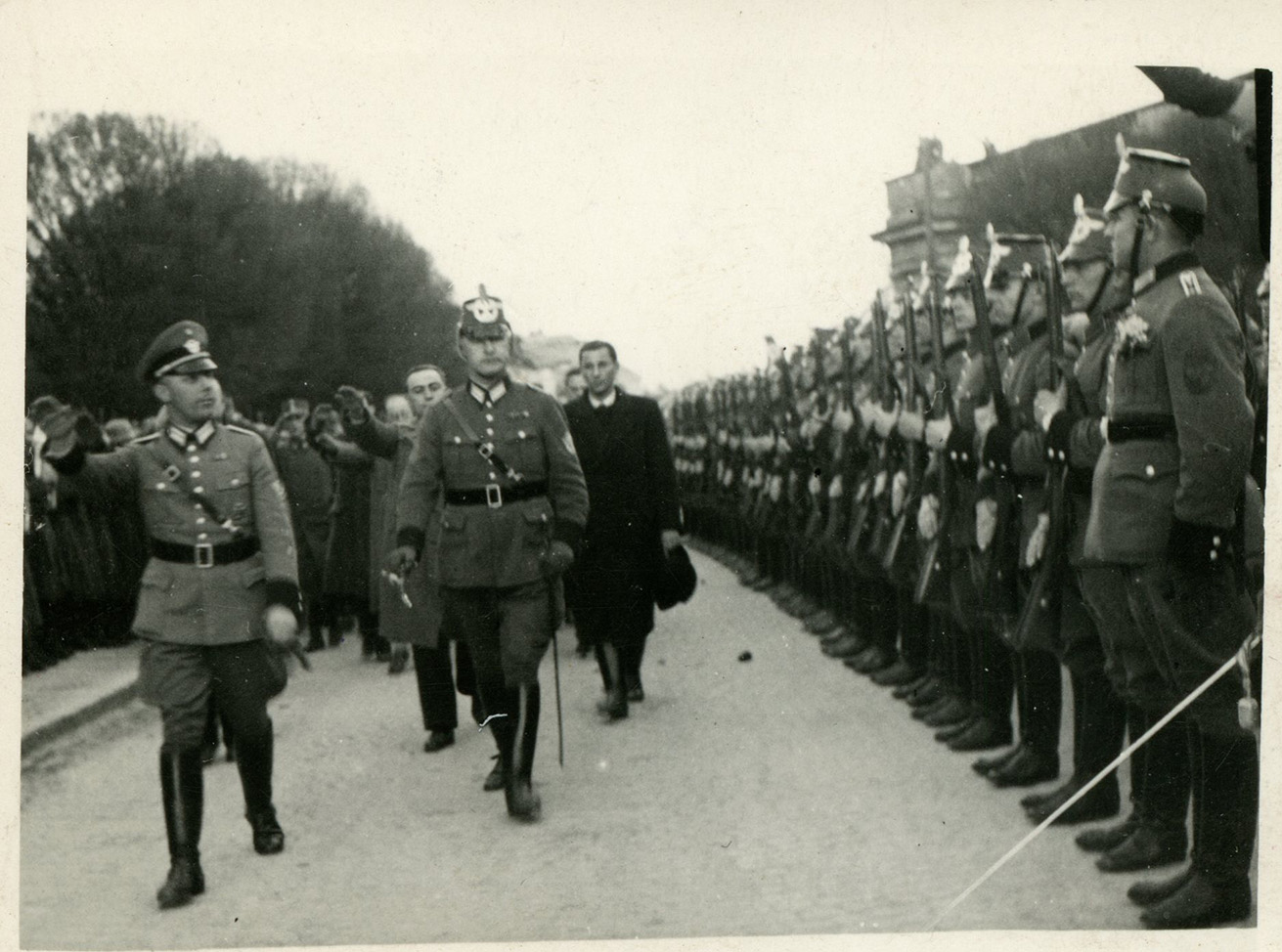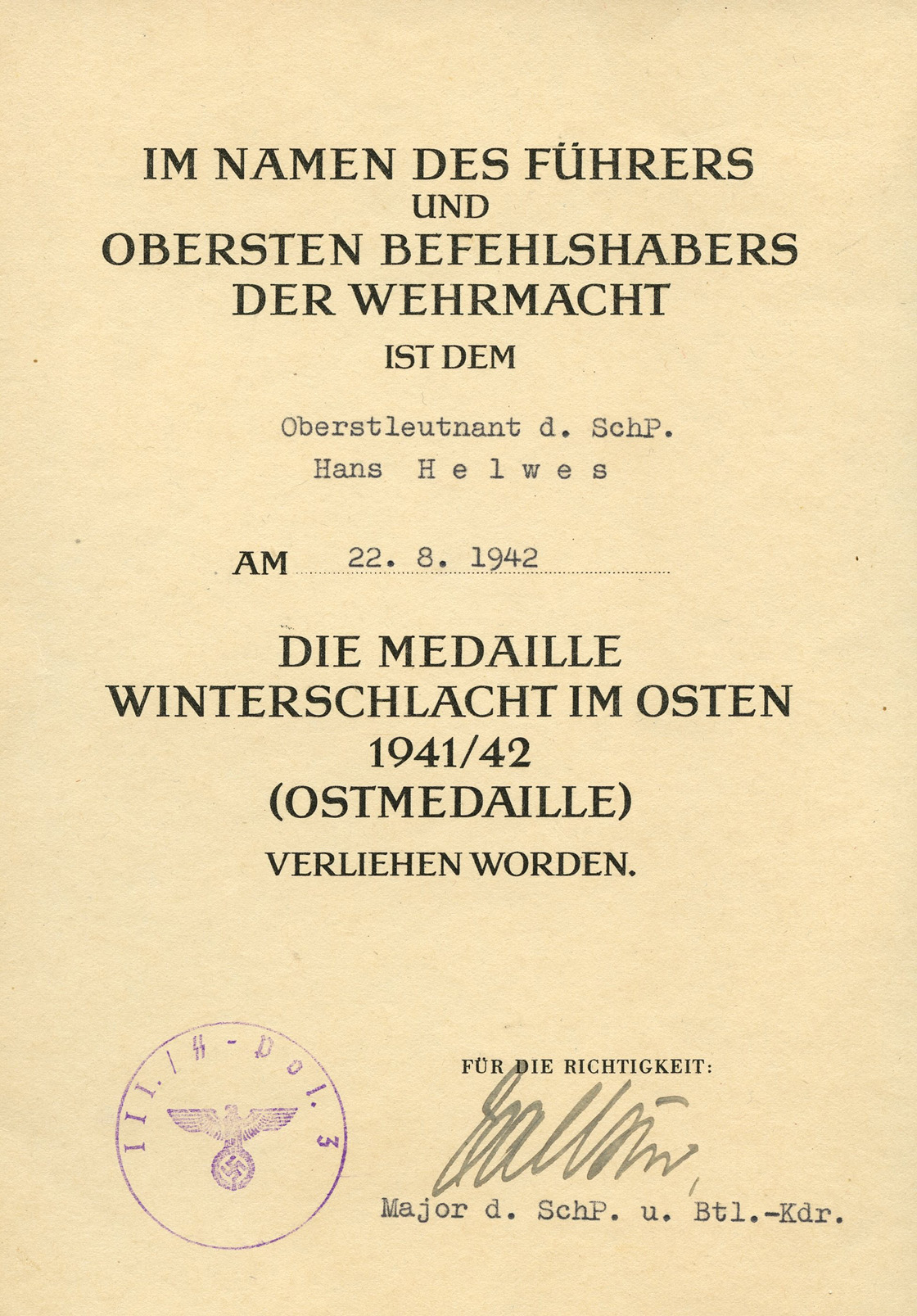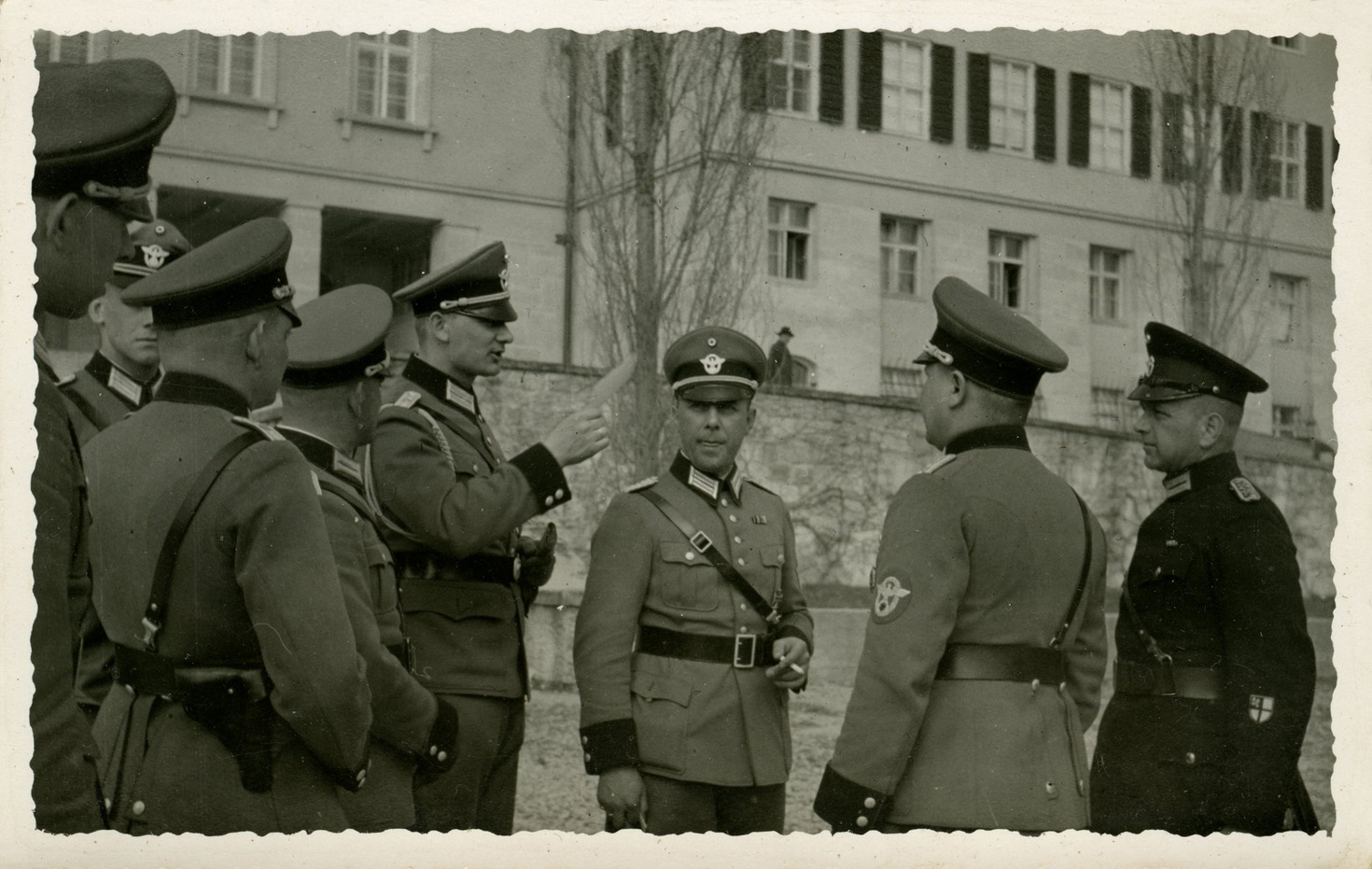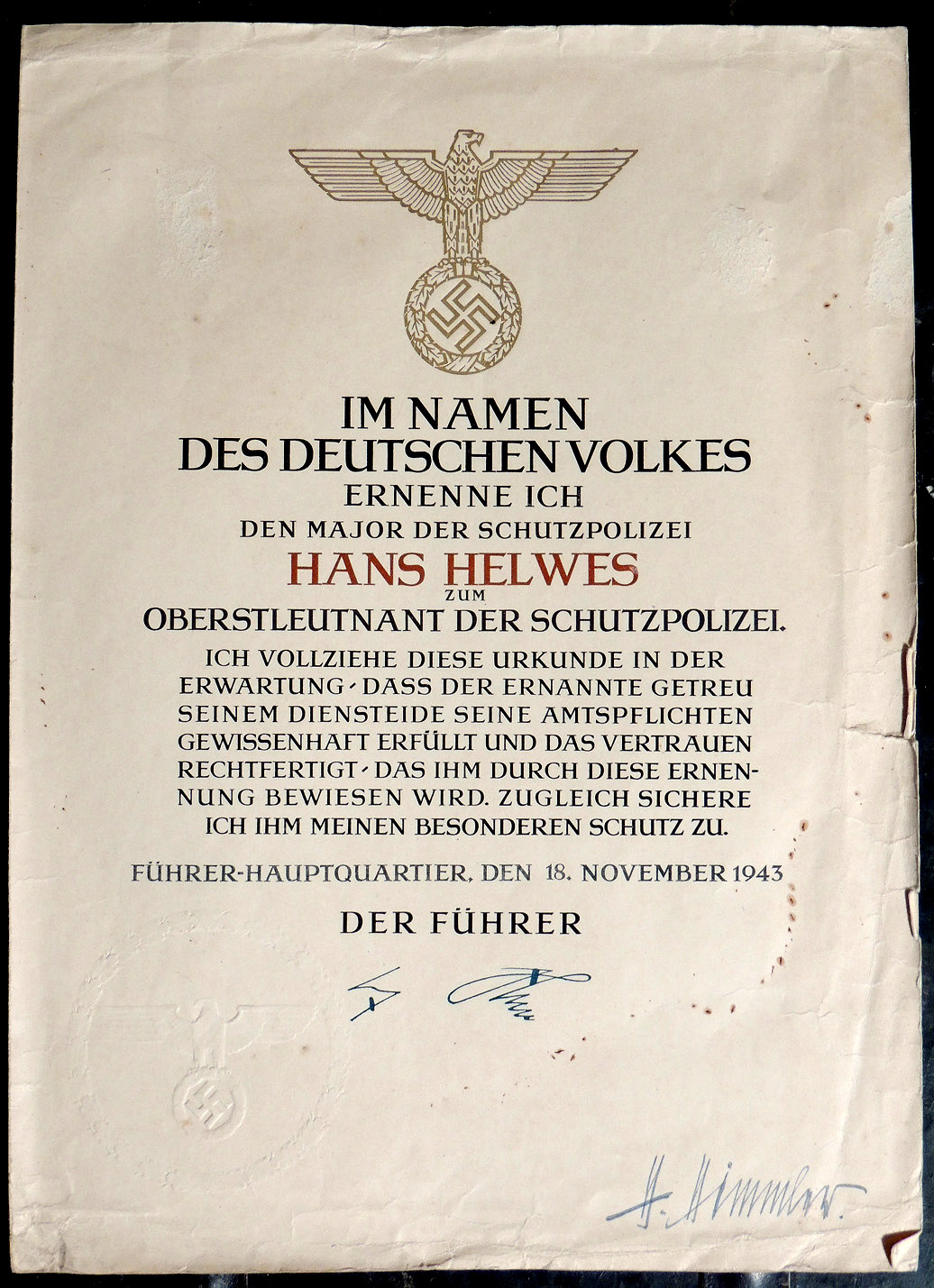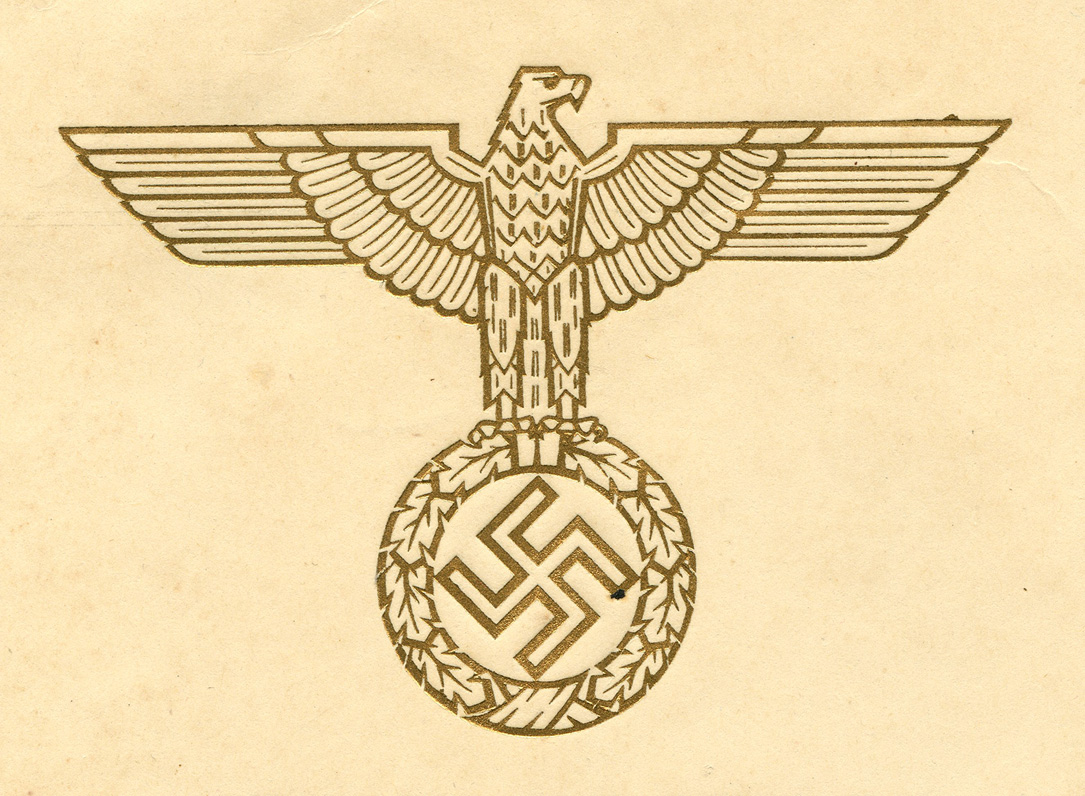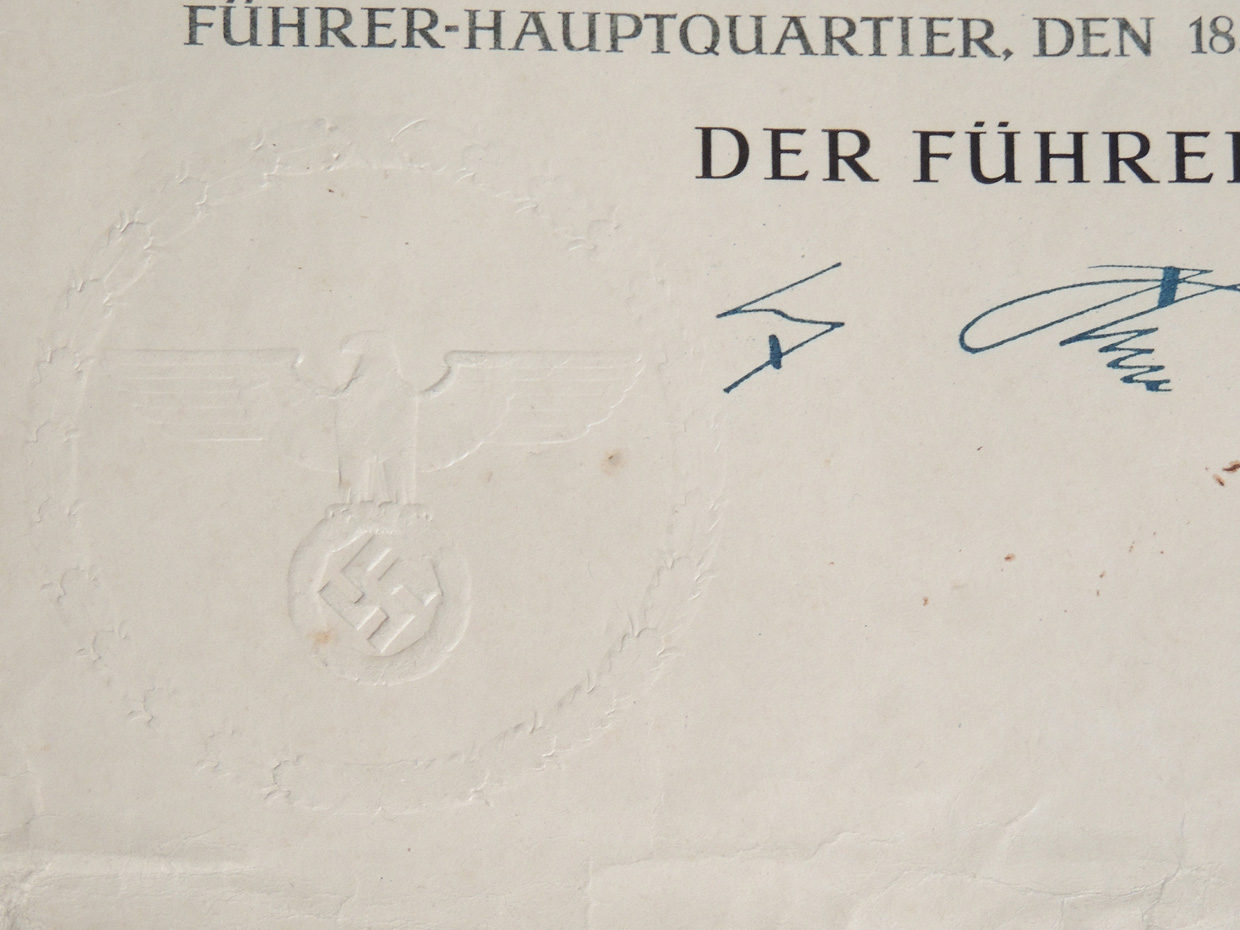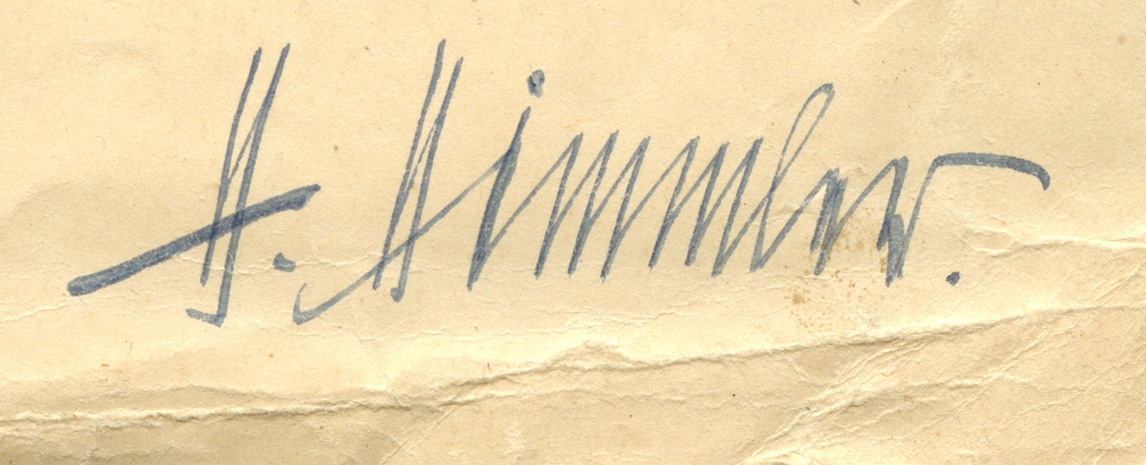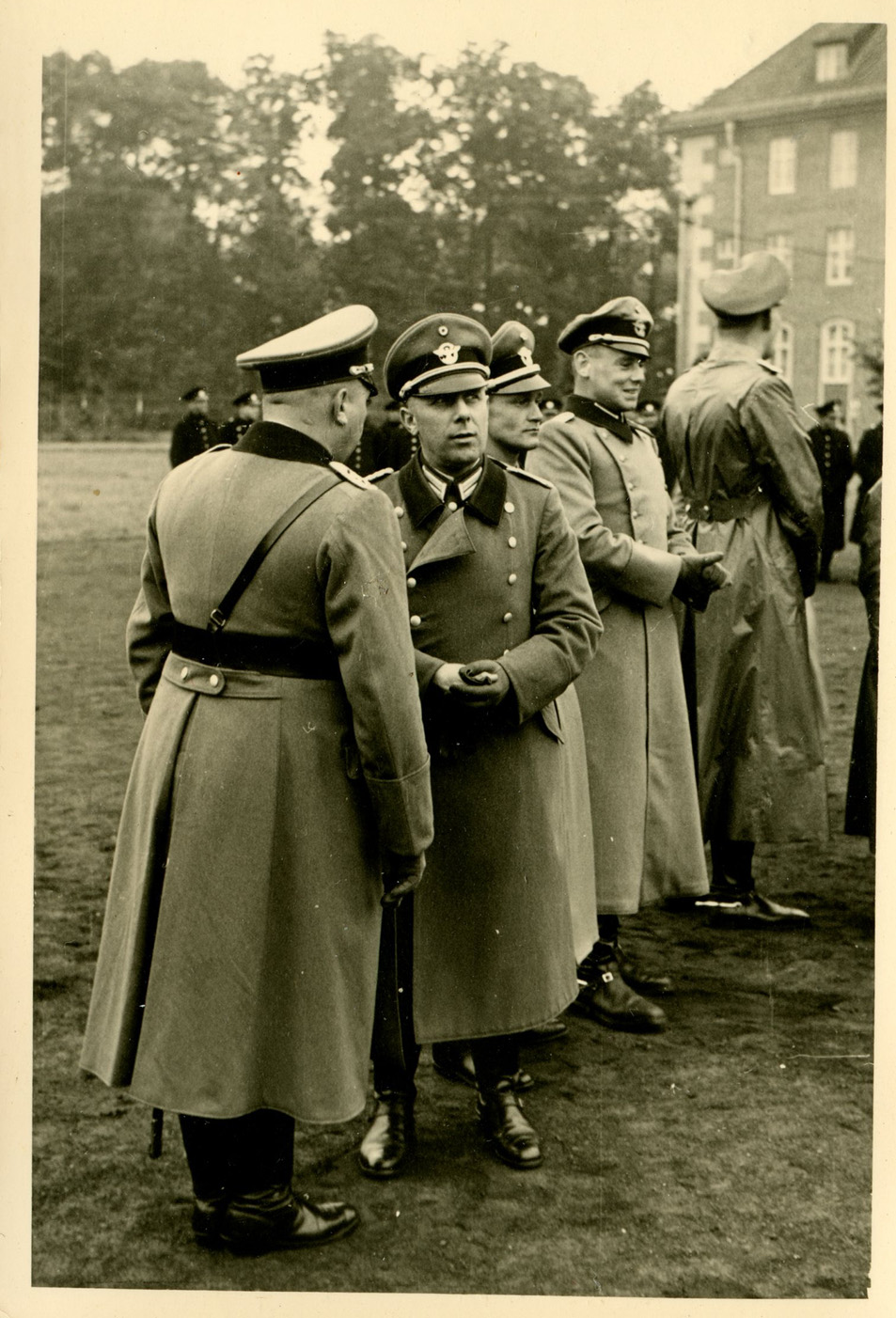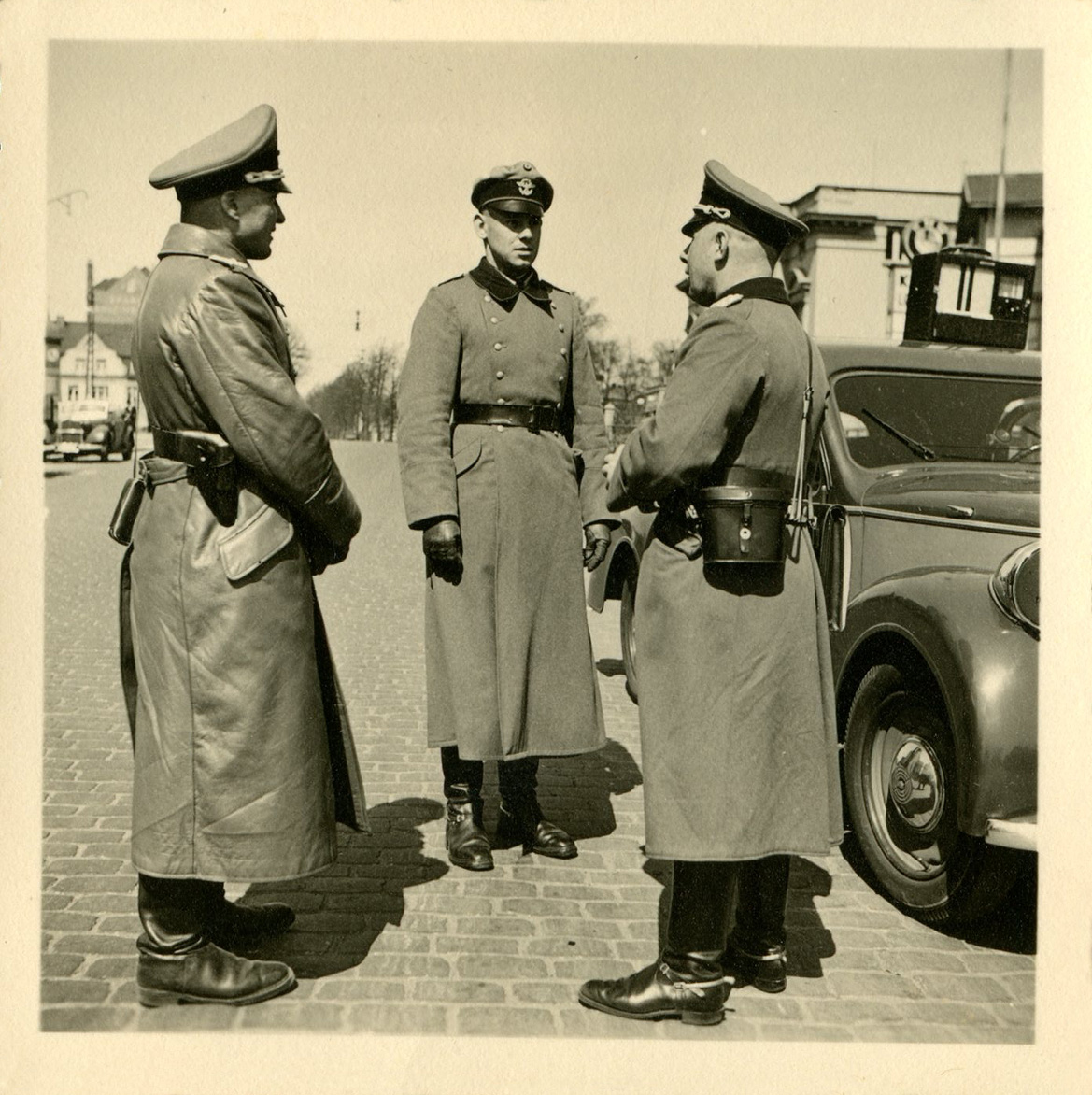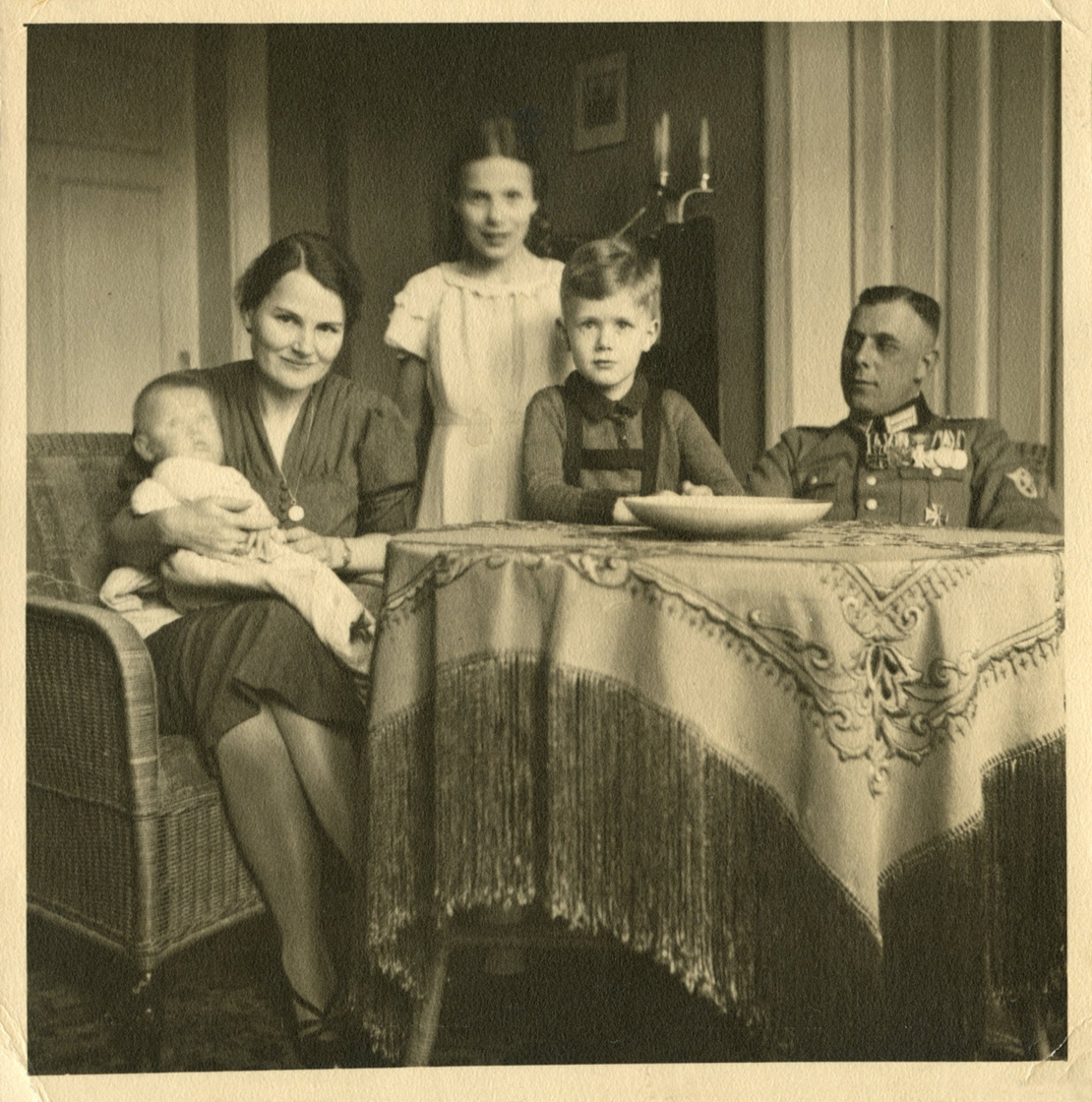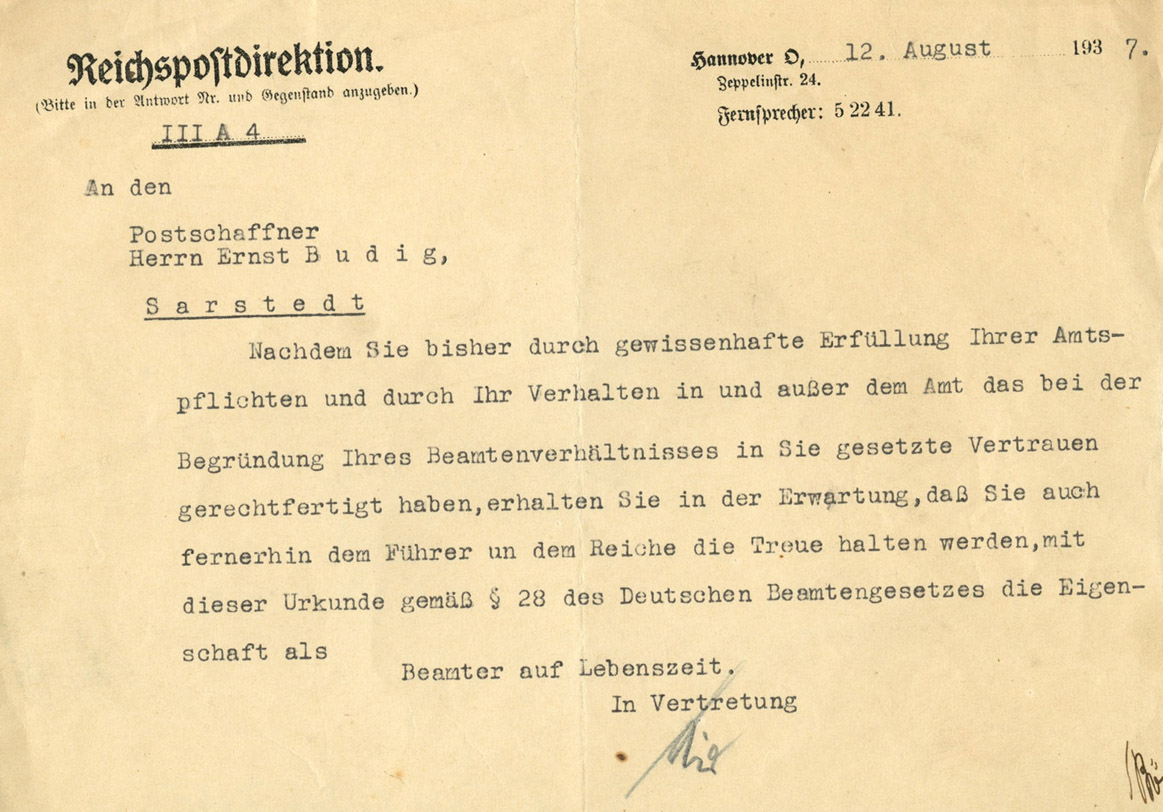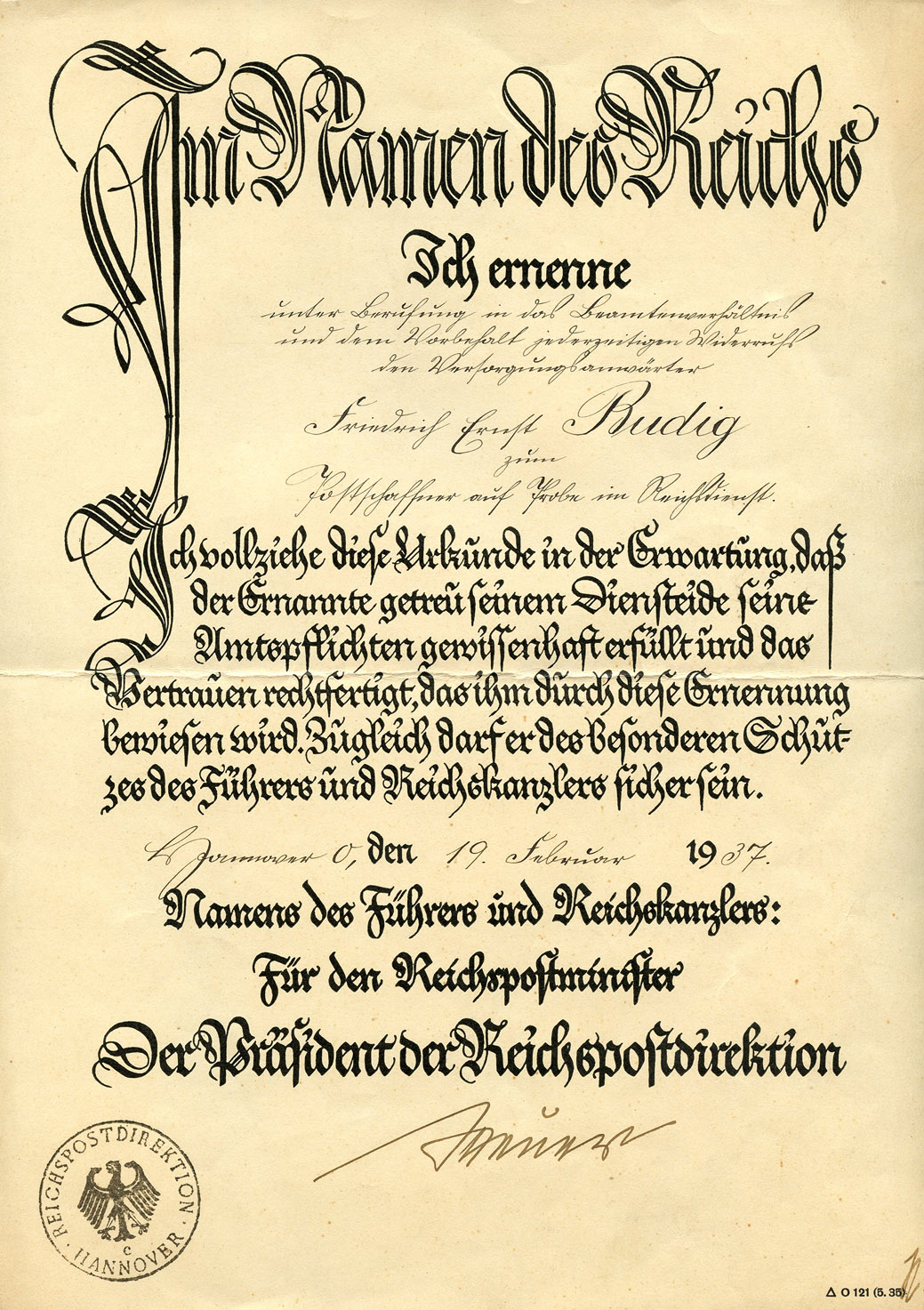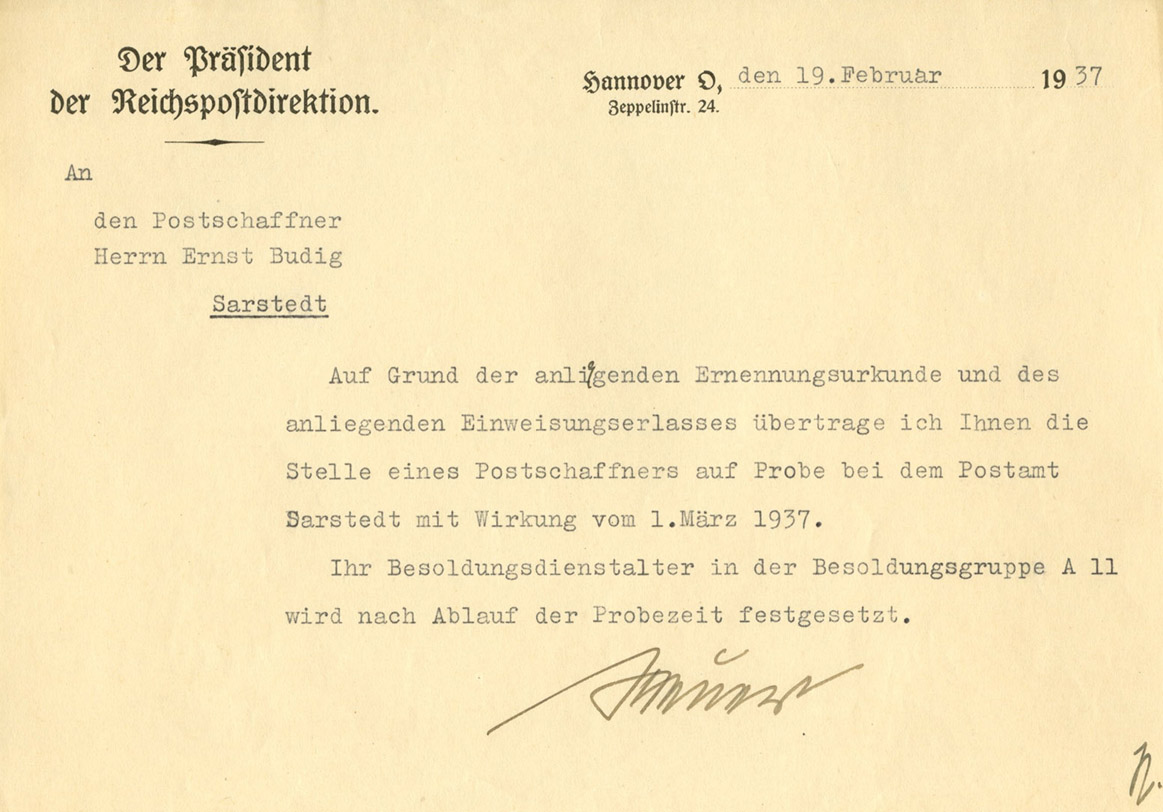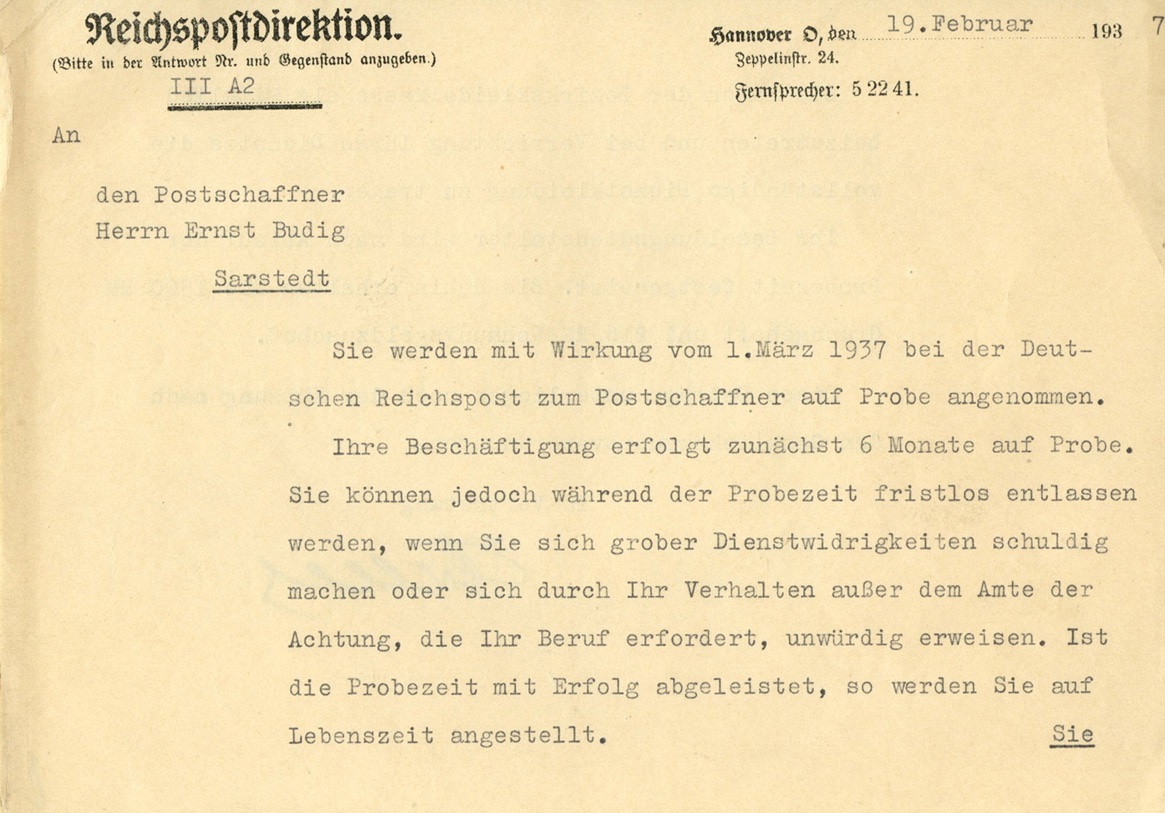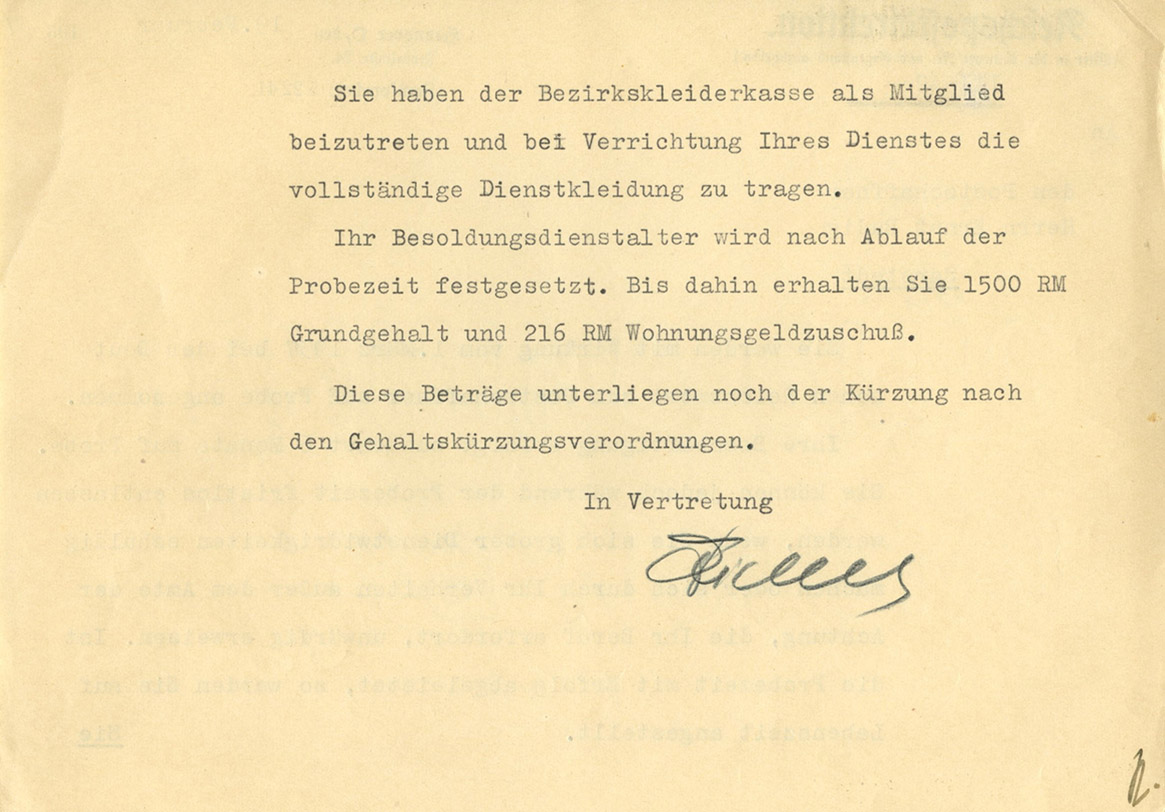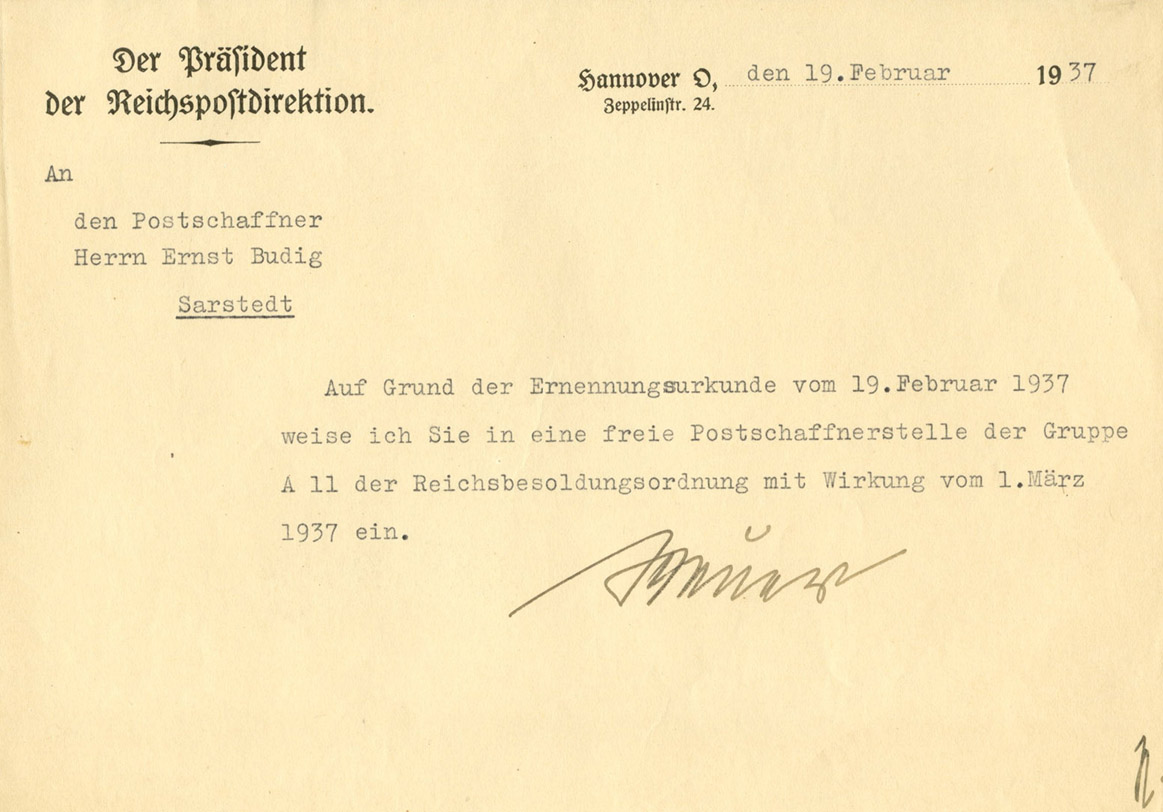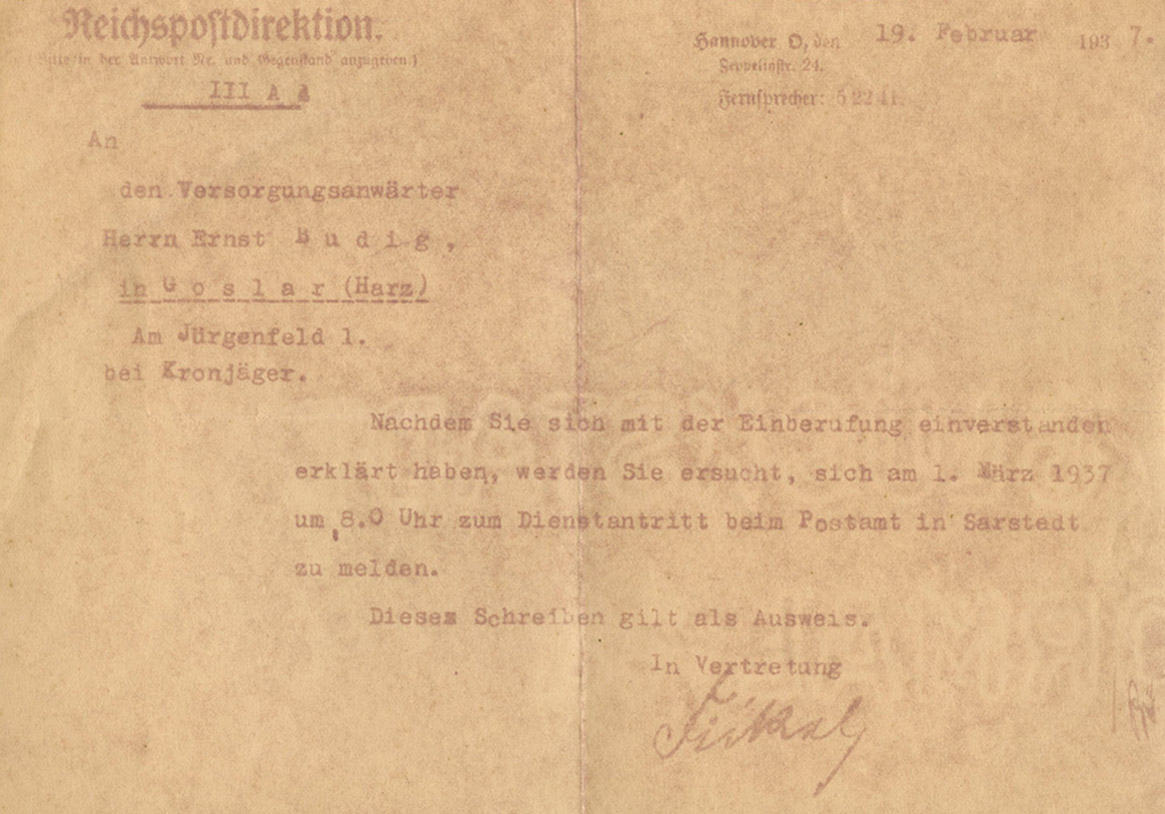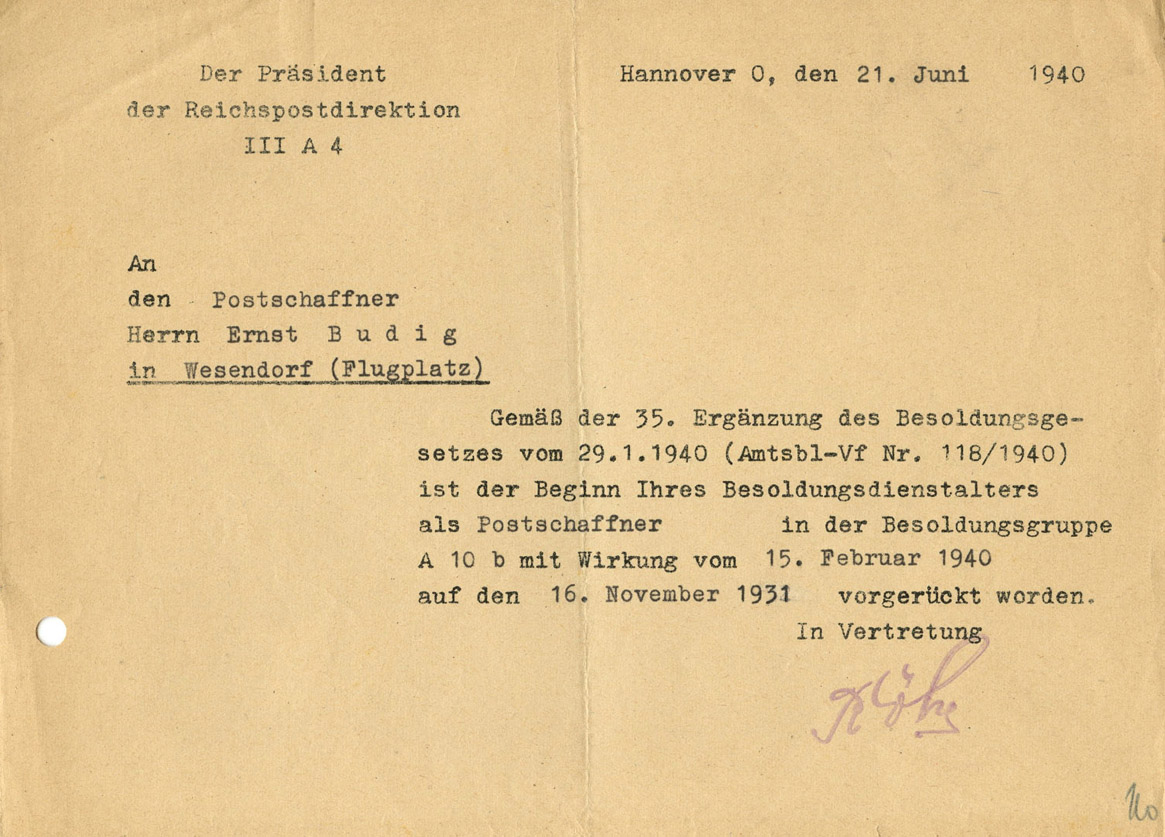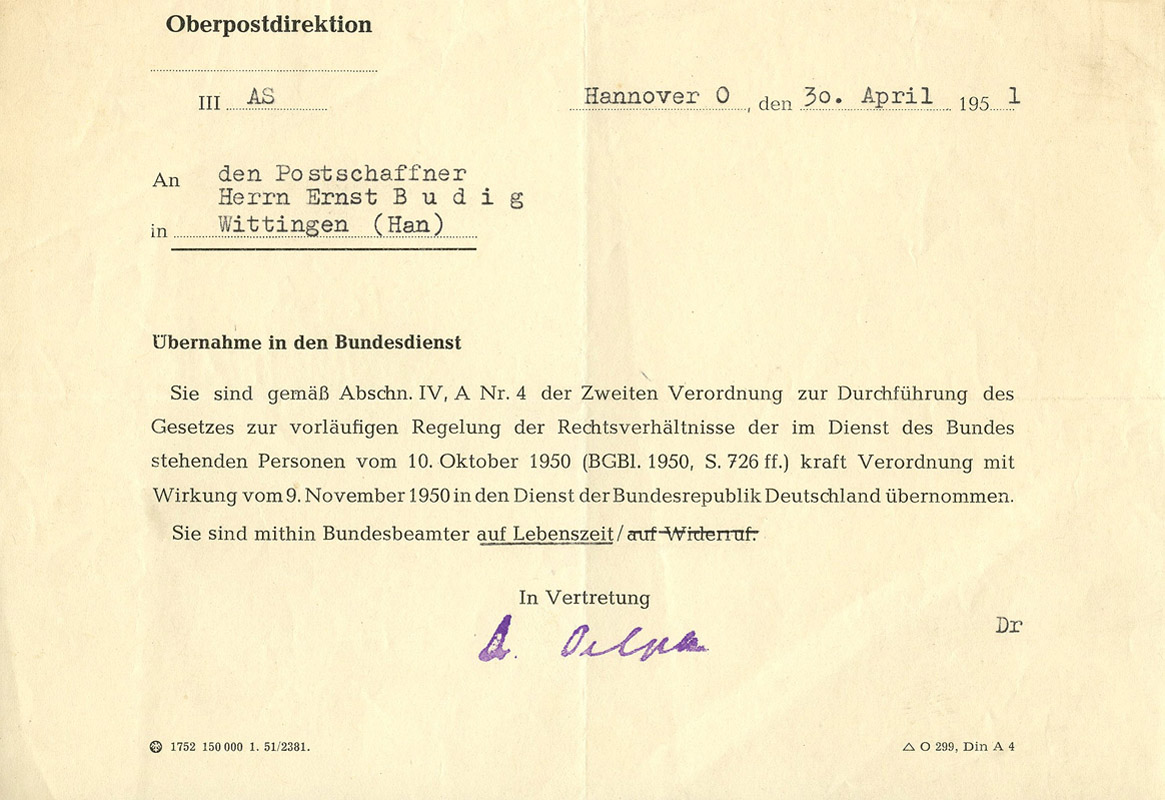

[Below: The certificate says: 'Reichsschwimmschein' (Reich swimming license) and 'hat die Prüfung im Schwimmen über 15 Minuten bestanden' (passed the swimming test over 15 minutes). Maybe this is some sort of qualification certificate to be a lifeguard or something of that nature?]
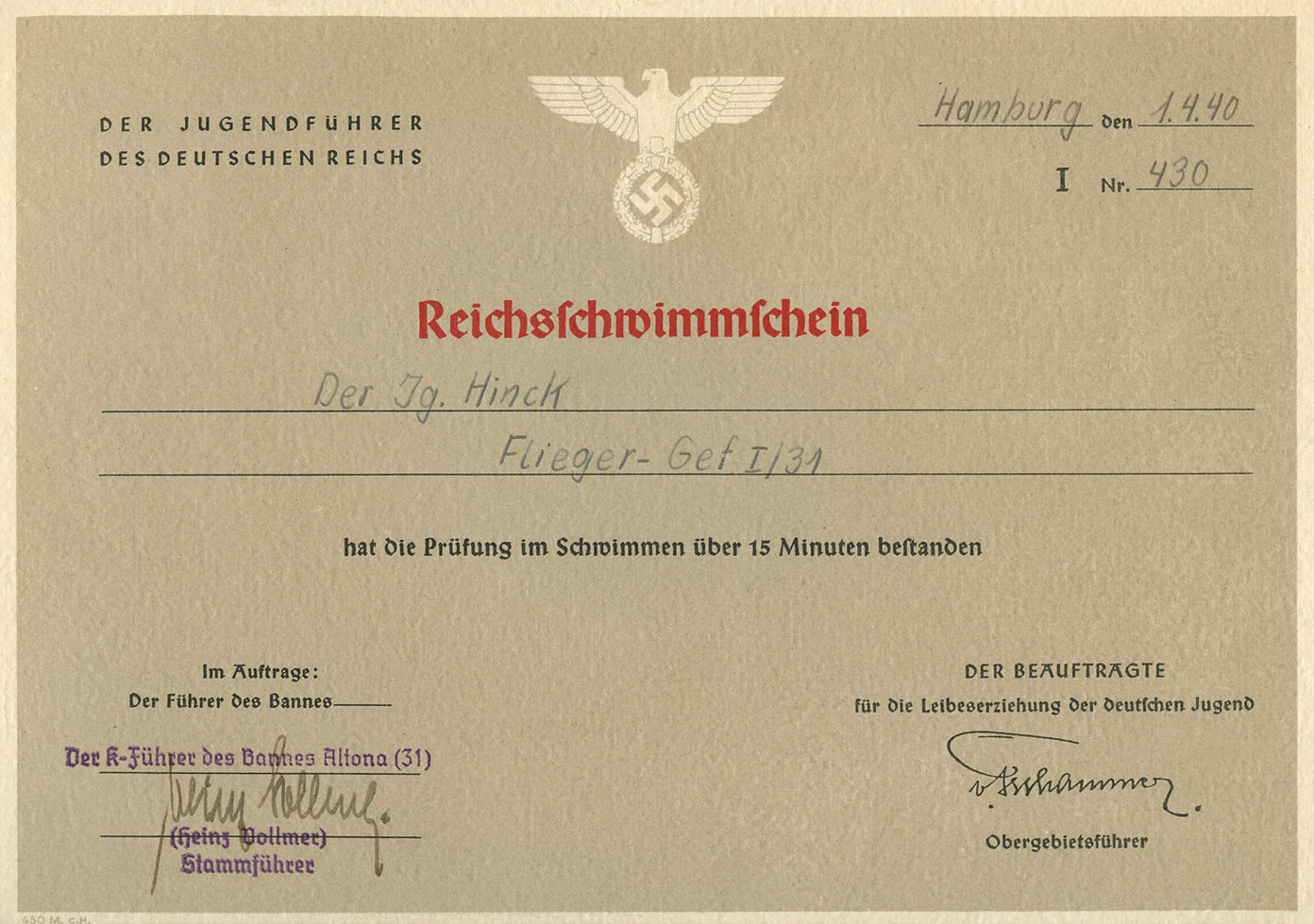

[Below: An interesting award certificate awarded to someone with the last name 'Abraham', a common Jewish name. But why would a Jew be awarded a medal for work done in 1940? Things are not what they seem my friend... it says:
'Der Führer hat Erlass vom heutigen Tage
dem Bauarbeiter Hans Abraham aus Altdorf
für verdienstvolle Arbeit zum Shutze
Deutschlands das Deutsche Schutzwall=Ehrenzeichen verliehen'
(The Führer has decreed from today
the construction worker Hans Abraham from Altdorf
for meritorious work in protection of
Germany awarded the German Protection Wall Medal of Honor)]
And:
'Der Staatsminister und Chef der Präsidialkanzlei des Führers und Reichskanzlers'
(Minister of State and Head of the Presidential Chancellery of the Führer and Reich Chancellor)
You'll note it is signed by a man named 'Meissner'. This is Otto Meissner (March 13, 1880 - May 27, 1953), head of the Office of the President of Germany from 1920 to 1945.
[Below: Otto Meissner]
[Below: And finally, the award certificate itself.]
[Below: The 'German Protection Wall Medal of Honor' medal, a rather common medal, is also known as the 'West Wall' medal. It was awarded to anyone who helped in the construction of the massive West Wall (also known as the Seigfried Line by the Allies) fortifications built to guard Germany from attack. It stretched more than 390 miles (630 km); 'from Kleve on the border with the Netherlands, along the western border of Germany, to the town of Weil am Rhein on the border to Switzerland – and featured more than 18,000 bunkers, tunnels and tank traps.'
While the fortified line could never be made into what it needed to be, due to lack of workers later in the war and lack of raw materials and guns, etc., it did partly perform its role in August 1944 during the Battles in the Hürtgen Forest, which proved to be a nightmare for the Americans. August of that year, the first small battles took place on the West Wall in the section of the line in the Hürtgenwald (Hürtgen Forest) area in the Eifel, 12 mi (20 km) southeast of the city of Aachen.
The Americans and British learned a terrible lesson in these battles and the ensuing Ardennes Offensive (Battle of the Bulge): that Germany would prove to be a terrible opponent. The Allies suffered 140,000 battle casualties, and that's just the ones they admitted. Many of the German soldiers on this part of the West Wall fought to the death. The dark and terrible Hürtgen Forest is still haunted with the grisly dead American soldiers who died there. Many of the Allied soldiers there refused to fight or even went mad.
Modern times reveal another comical episode of terror of everything 'Nazi'. Often times lost and buried pillboxes or stretches of the 'Dragon's Teeth' anti-tank barriers are still unearthed in Germany. Money has been specifically allocated to immediately destroy them! Lest modern 'Nazis' use them for propaganda purposes. Historians and even nature conservationists attempt to stop the government are met in failure. What a laughable, pathetic bunch of bullshit, and splendid show of the terror the enemies of truth STILL after almost a CENTURY still have for the National Socialists.]
[Below: Here's another West Wall certificate with odds and ends of awardee. First the certificate. Note that it tells that the awardee, Josef Mock, worked in the RAD labor service and worked in the regions of 'Eifel', which is referred to as 'Germany's Wild West' and 'Dauwelshausen', a locality in Rhineland-Palatinate, in Western Germany near the border with Luxemburg.]
[Below: Here is the award envelope (front/reverse) that the West Wall medal (shown above) was awarded in. The medal and bags are fairly plentiful, since so many workers were involved. The award envelopes are rarer than the actual medals. This is often the case in 3rd Reich awards, since a lot of people probably just threw the envelopes away. Some envelopes and award boxes are worth more than the actual medals they came with. And further, some award boxes actually came inside a cardboard type box... those are rarer still.]
[Below: Here is a tinnie from 1939 dealing with the Westwall. On the bottom you can see the 'Dragon's Teeth' tank traps. Kaiserslautern is a city in southwest Germany in the state of Rhineland-Palatinate and is at the edge of the Palatinate Forest. 'Gau' means region and 'tag' means day. So this tinnie was for the region (Gau) of Kaiserlautern for a Westwall day (tag) in 1939.]
[Below: Here is a Westwall postcard.]
[Below: Here is the postal cancel to match the tinnie and postcard above.]
[Below: Front/back. This high quality and rather beautiful little booklet says 'Handwerkskammer für Niederbayern' and 'Lehrzeugnis' (Chamber of Crafts for Lower Bavaria -
Teaching Certificate).]
[Below: The first page within reveals that this was issued on October 4, 1940 to a woman named Therese.]
[Below: We can see by the stamp that this was issued in Passau, a city in Lower Bavaria. Passau is a small and ancient city, being over 2,000 years old and having a population of about 50,000, 12,000 of them being students at the University of Passau.]
[Below: The rest of the pages are blank.]
[Below: This award says 'Besitzzeugnis - Im Namen des Führers' (Certificate of Ownership - In the name of the leader) 'Feldwebel' (sergeant) 'der Krimschild verliehen' (awarded the Crimean Shield). And although you can't read the date, it is most likely January 30, 1943.]
[Below: The Krim Shield.]
[Below: This is an award folder/certificate is from the 'National Socialist League of the Reich for Physical Exercise' (NSRL). This was the National Socialist organization for sports and physical education.]
[Below: It says: 'in Anerkennung für den beim fest der Leibesübungen - Schwimmen -' (in recognition of the physical exercise festival - Swimming -).]
[Below: This beautiful certificate, from Berlin 1938, is from the Hitler Youth, it says: 'Beteiligungs Urkunde - Harald Fritsche - hat diese Urkunde durch die Teilnahme am Berufswettkampf aller schaffenden Deutschen erworben' (Participation certificate - Harald Fritsche - has acquired this certificate through participation in the professional competition of all working Germans).]
[Below: This gorgeous work of art is over 14 inches long. It is made of a thick, parchment-like paper, with the eagle shining like metal. It is a beautiful thing to behold in person. The pictures do it no justice.]
[Below: Eagle close-up. Click to enlarge.]
[Below: Inside. Click to enlarge.]
'Im Namen
(On behalf
[Below: Embossed eagle seal. Click to enlarge.]
[Below: Signature of Hermann Göring. Click to enlarge.]
[Below: Hans Helwes, far left. March 15, 1938.]
[Below: Certificate for the Medal for the Campaign in Russia 1941-1942 (Die Medaille Winterschlacht im Osten 1941-1942). August 22, 1942. Check out the cool SS handstamp. Also note that Major Helwes has now been promoted to Oberstleutnant. This is equivalent to a lieutenant colonel! ]
[Below: Hans Helwes, 3rd from right. March 17, 1938.]
[Below: The best for last. This is a massive certificate (approximately 14 inches vertically)! Truly beautiful. This is the inside of a folder. This is the promotion document making Major Helwes an Oberstleutnant (lieutenant colonel). November 18, 1943. The Adolf Hitler signature is an autopen (machine signed) but note the other signature in the bottom right corner, it's none other than Heinrich Himmler!]
[Below: Close-up of eagle.]
[Below: Close-up of huge embossed eagle seal.]
[Below: Close-up of Heinrich Himmler signature.]
[Below: Hans Helwes, second from left, circa 1940.]
[Below: Hans Helwes, right.]
[Below: Hans Helwes, sporting a spectacular medal bar, with his family. Circa 1940.]
[Below: This very cool-looking certificate says:
'Deutsches
(German
[Below: This is a group of documents of a postal official by the name of Ernst Budig. This document, from August 12, 1937, says:
'Nachdem Sie bisher durch gewissenhafte Erfüllung Ihrer Amtspflichten
(Having conscientiously fulfilled your official duties
[Below: This extravagant promotion document, to Postmaster Ernst Budig, from February 19, 1937, says:
'Im Namen des Reichs
(In the name of the Reich
And at the bottom:
'Namens des Führers und Reichskanzlers:
(On behalf of the Führer and Reich Chancellor:
[Below: This document of Postmaster Ernst Budig, from August 12, 1937, says:
'Auf Grund Anlingenden Ernennungsurkunde und des
(On the basis of the enclosed certificate of appointment and the
[Below: This document of Postmaster Ernst Budig, from February 19, 1937, says:
'Sie werden mit Wirkung vom 1.März 1937 bei der Deutschen
(Effective March 1, 1937, you will be employed by the German
[Below: Page two says:
'Sie haben der Bezirkskleiderkasse als Mitglied
Diese Beträge unterliegen noch der Kürzung nach
(You shall join the district clothing fund as a member
These amounts are still subject to reduction in accordance with
[Below: This document, also from February 19, 1937, says:
'Auf Grund der Ernennungsurkunde vom 19.Februar 1937
(On the basis of the certificate of appointment dated February 19, 1937,
[Below: This carbon copy document, also from February 19, 1937, says:
'Nachdem Sie sich mit der Einberufung einverstanden
(After you have agreed to the convocation
[Below: This document, from June 21, 1940, says:
'Gemäß der 35. Ergänzung des Besoldungsgesetzes
(Pursuant to the 35th Amendment to the Salary Law
[Below: This document follows Herrn Budig after the war, from April 30, 1951, and says:
'Übernahme in den Bundesdienst
(Transfer to the Federal Service
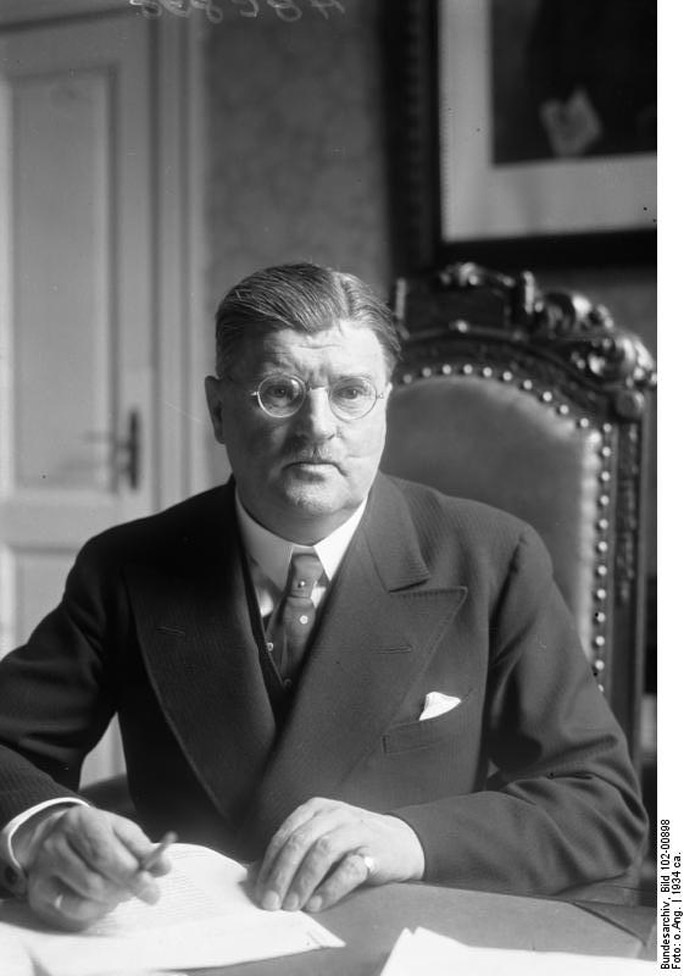
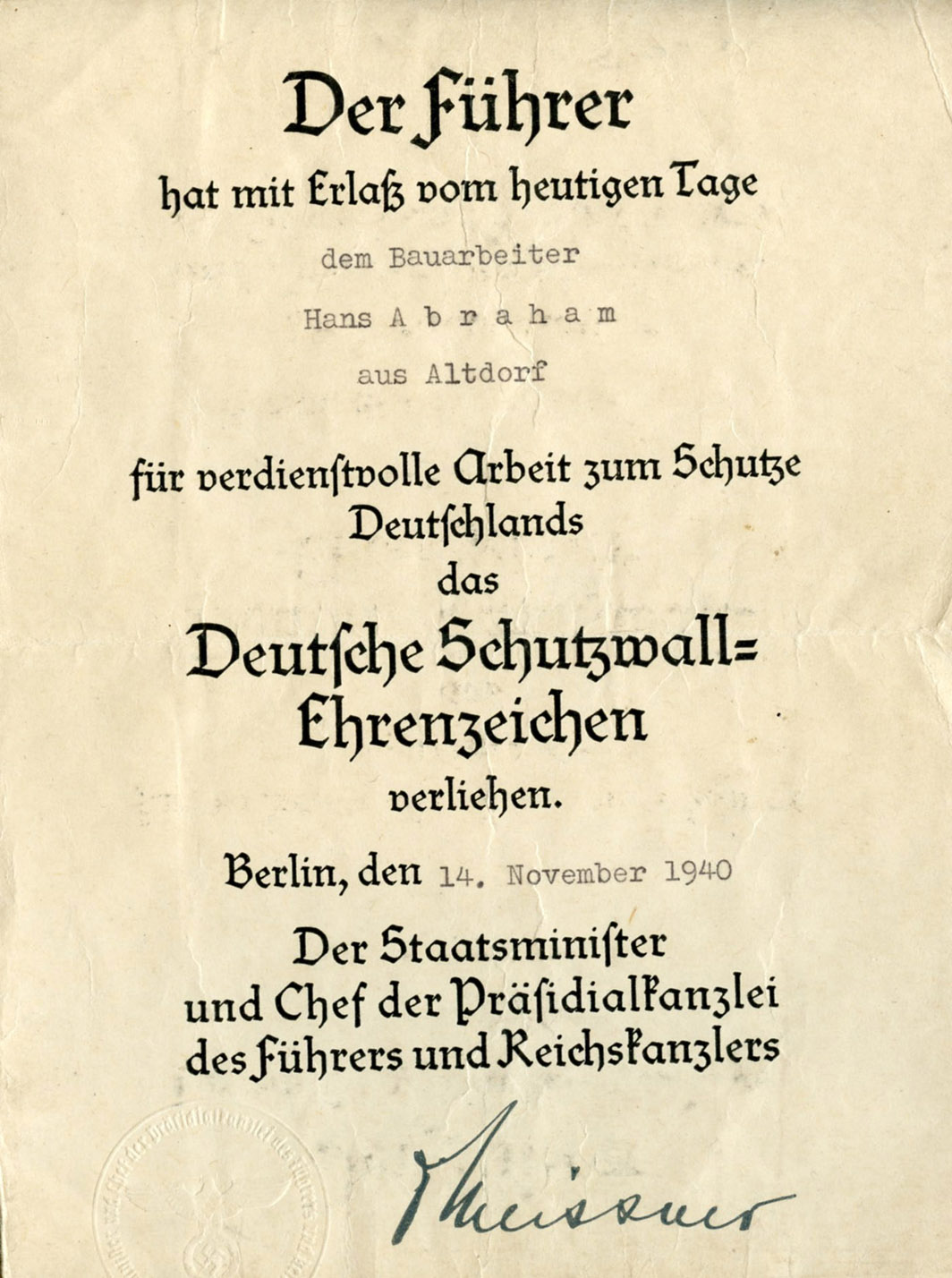
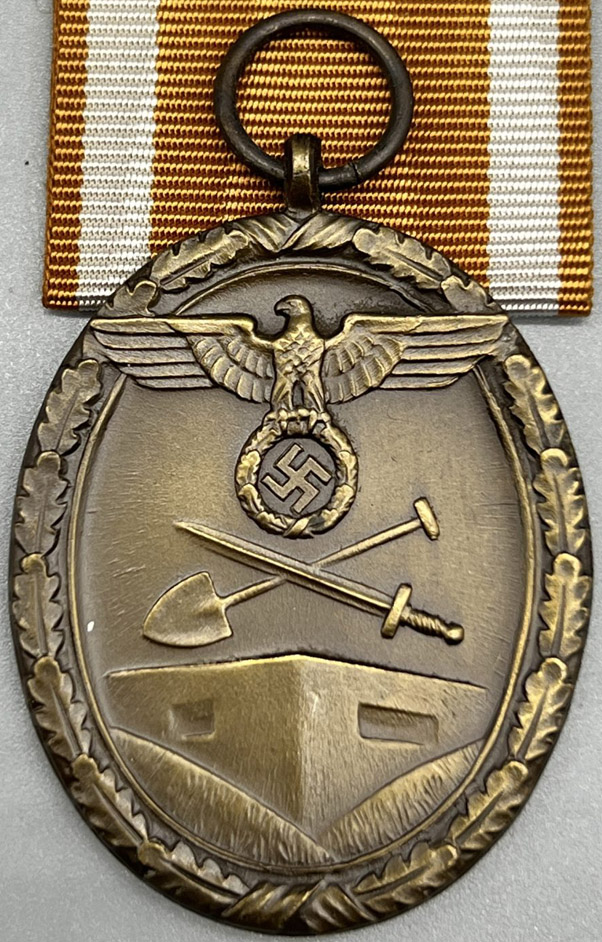
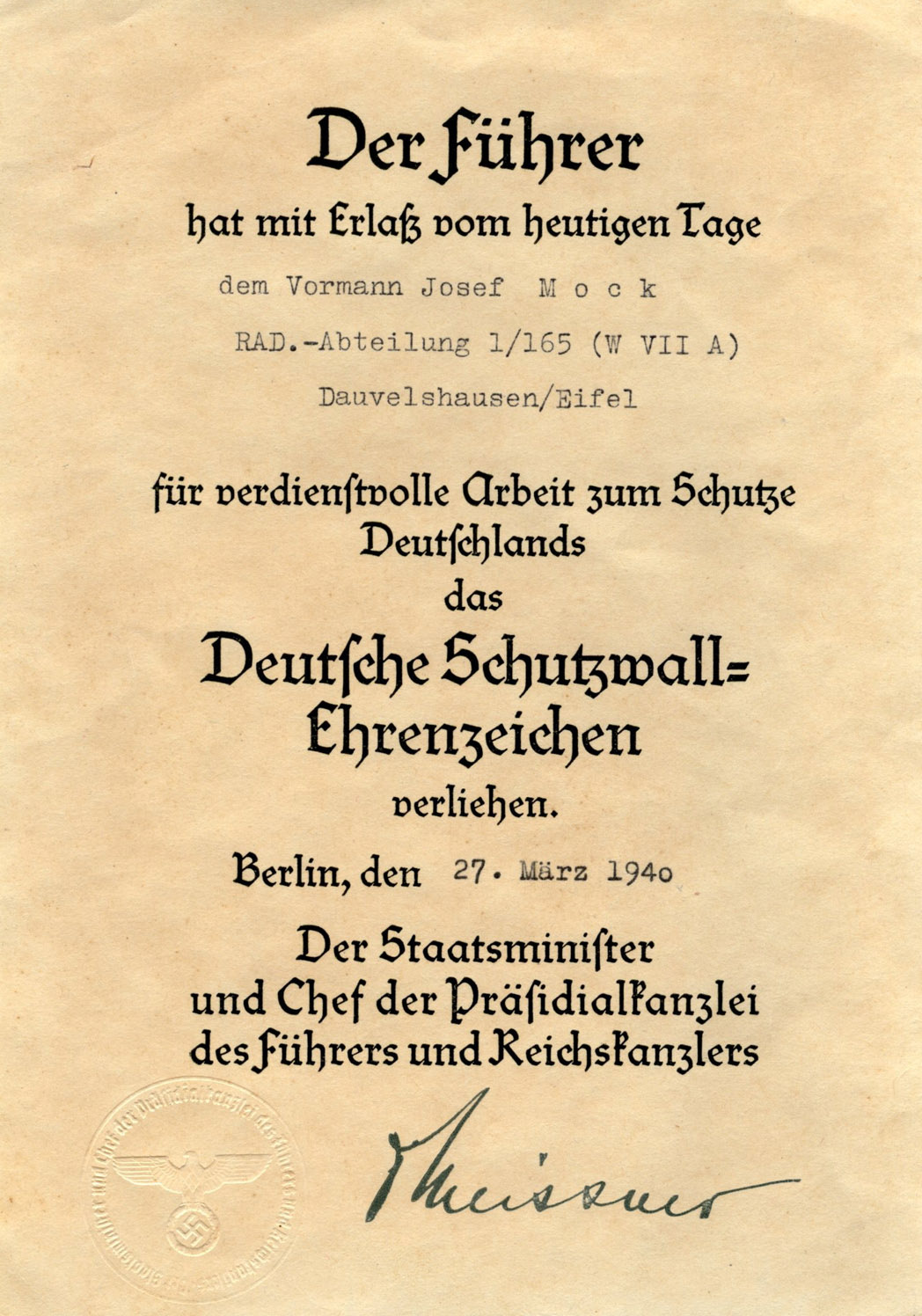

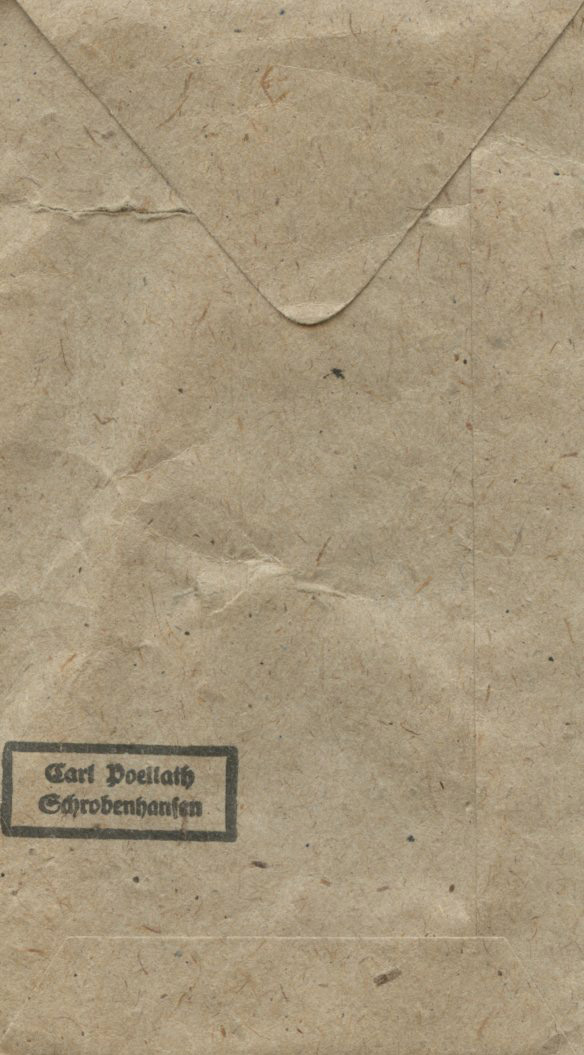
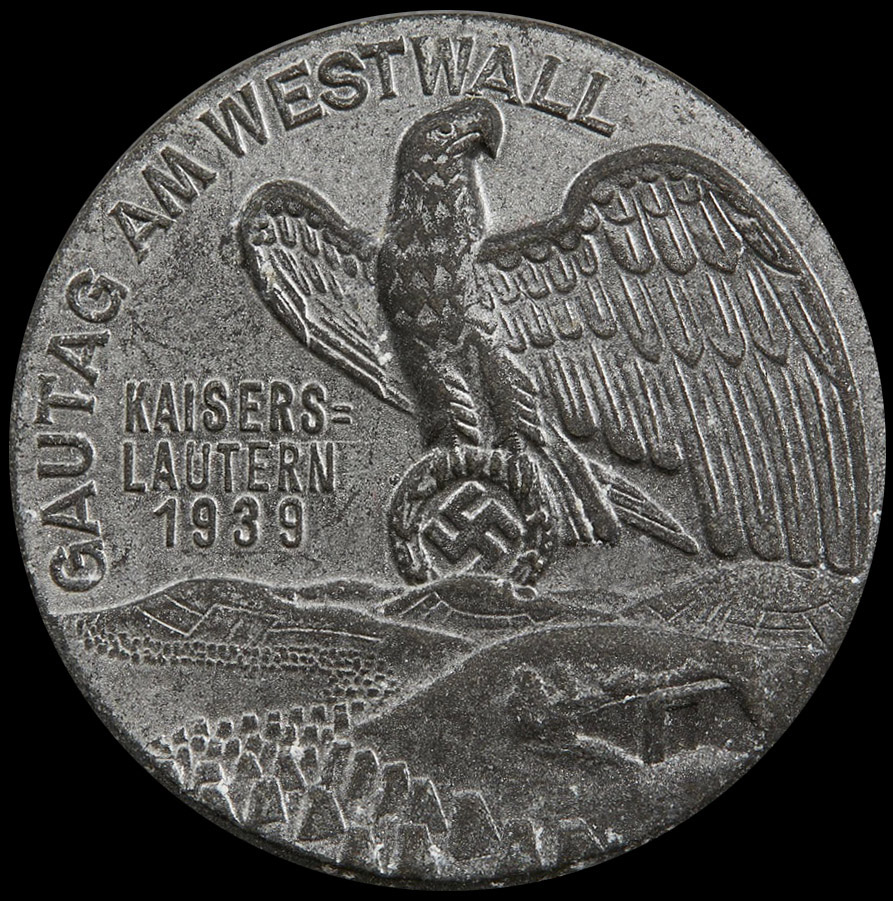
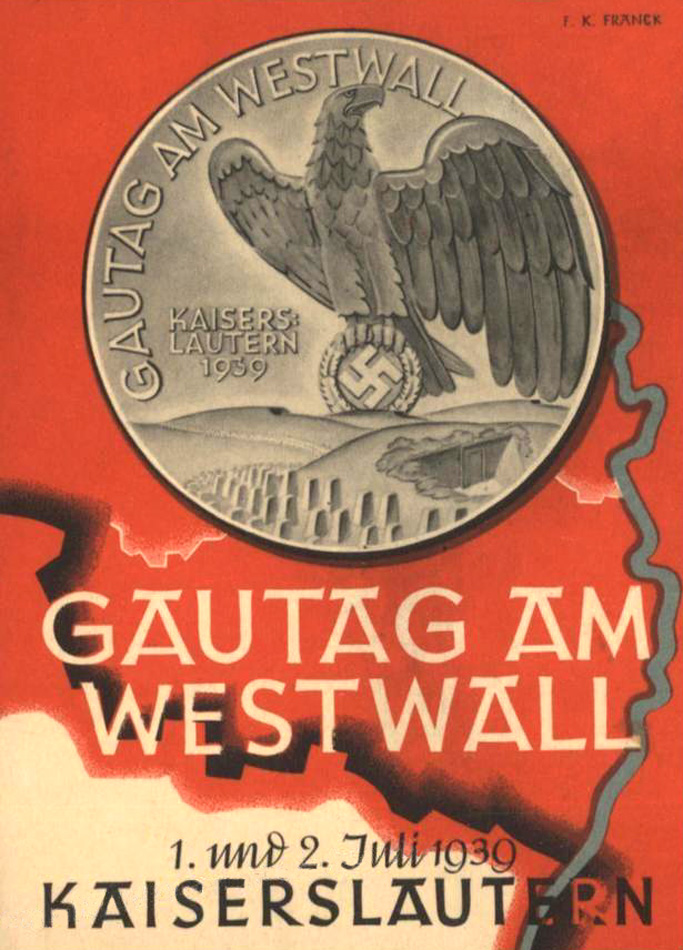
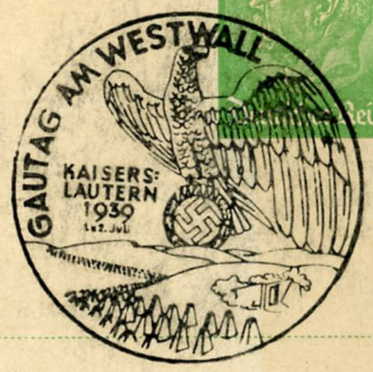

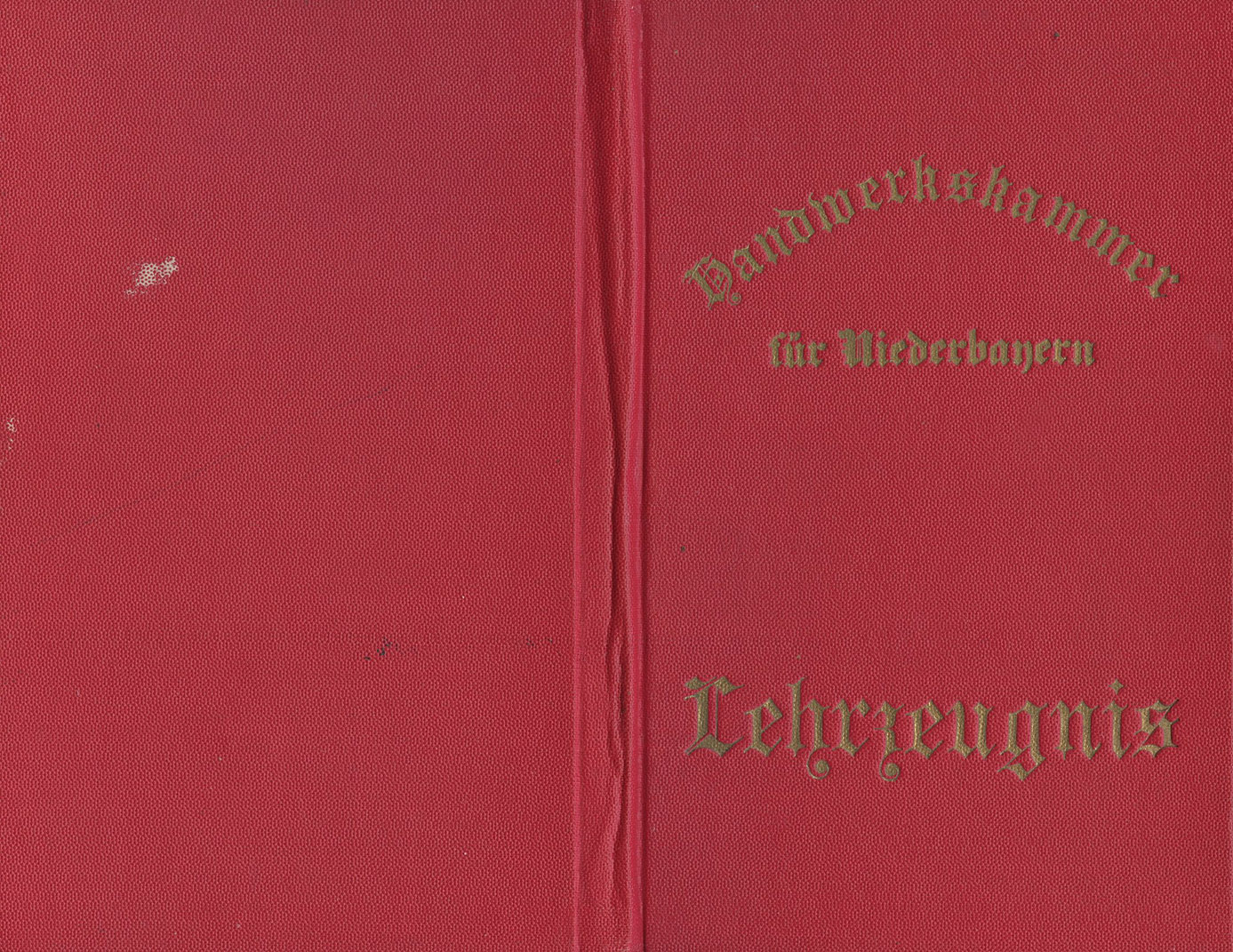
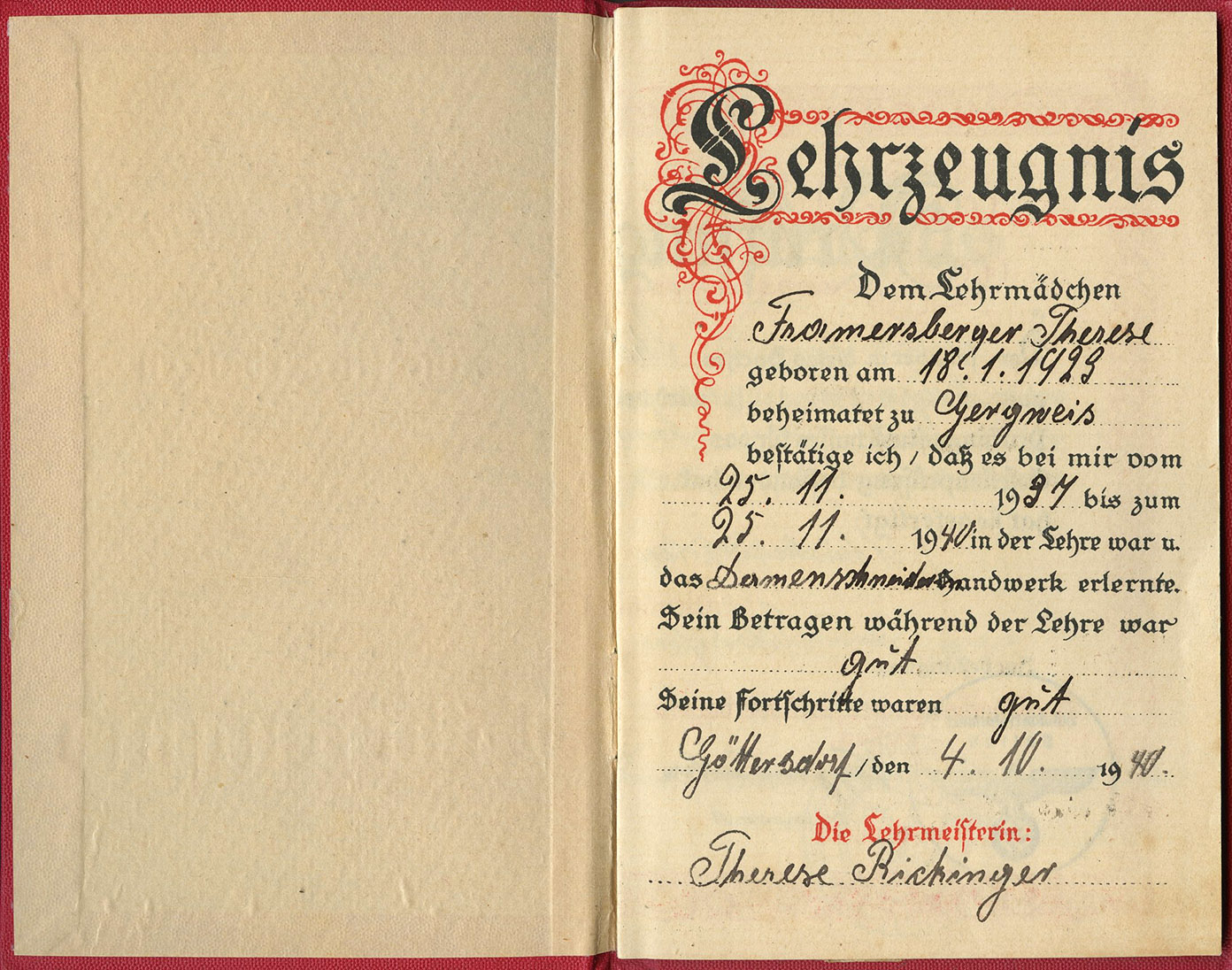
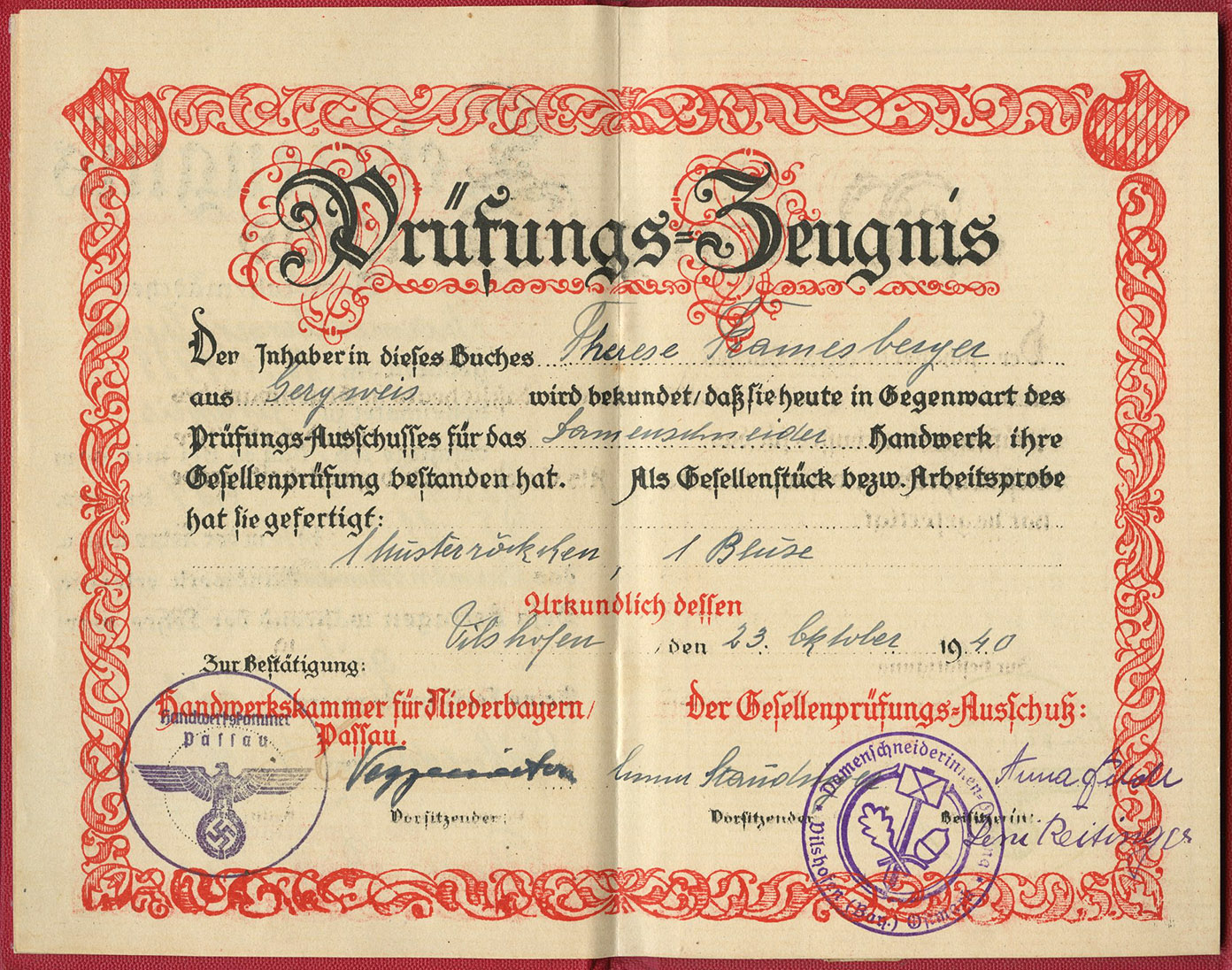
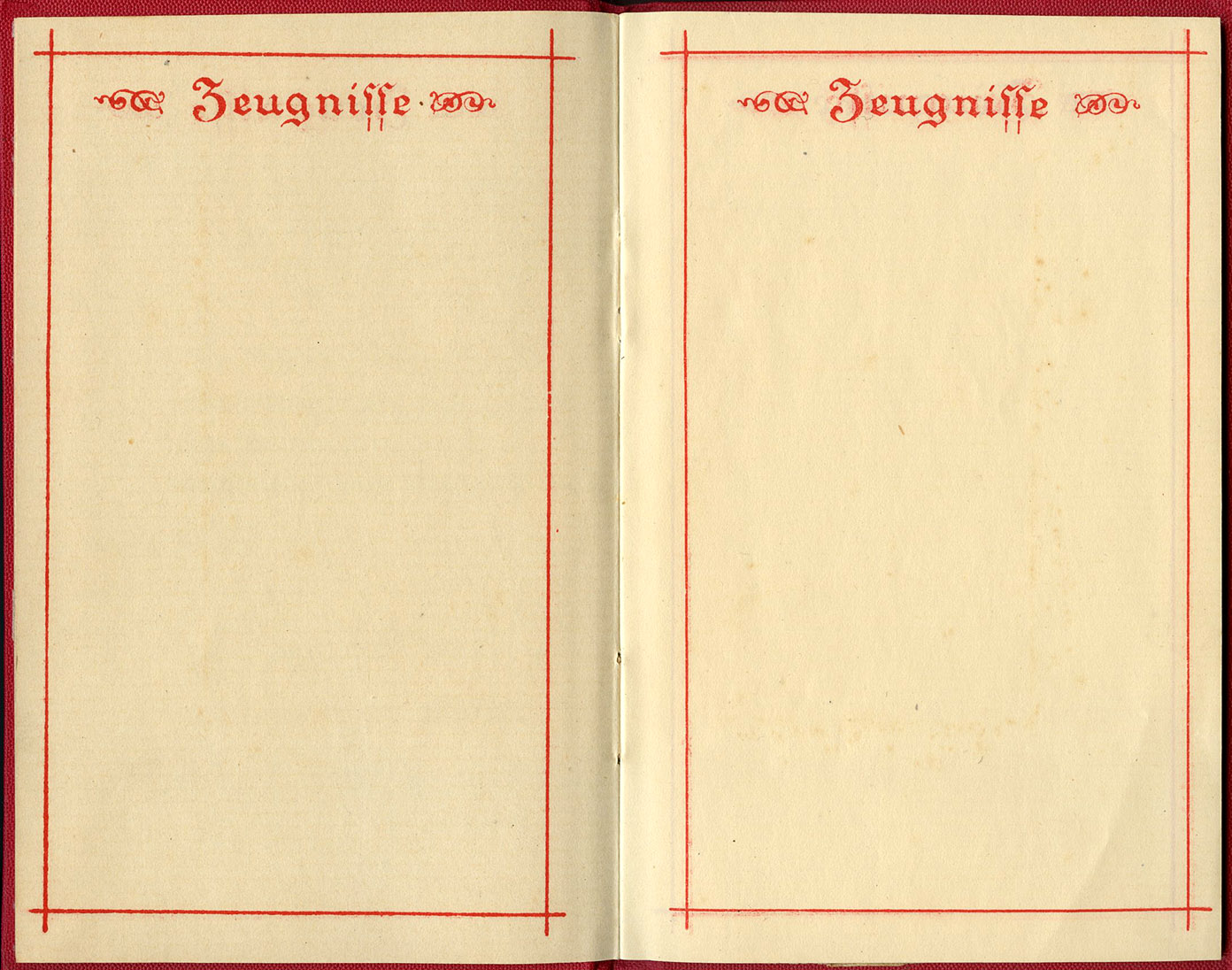

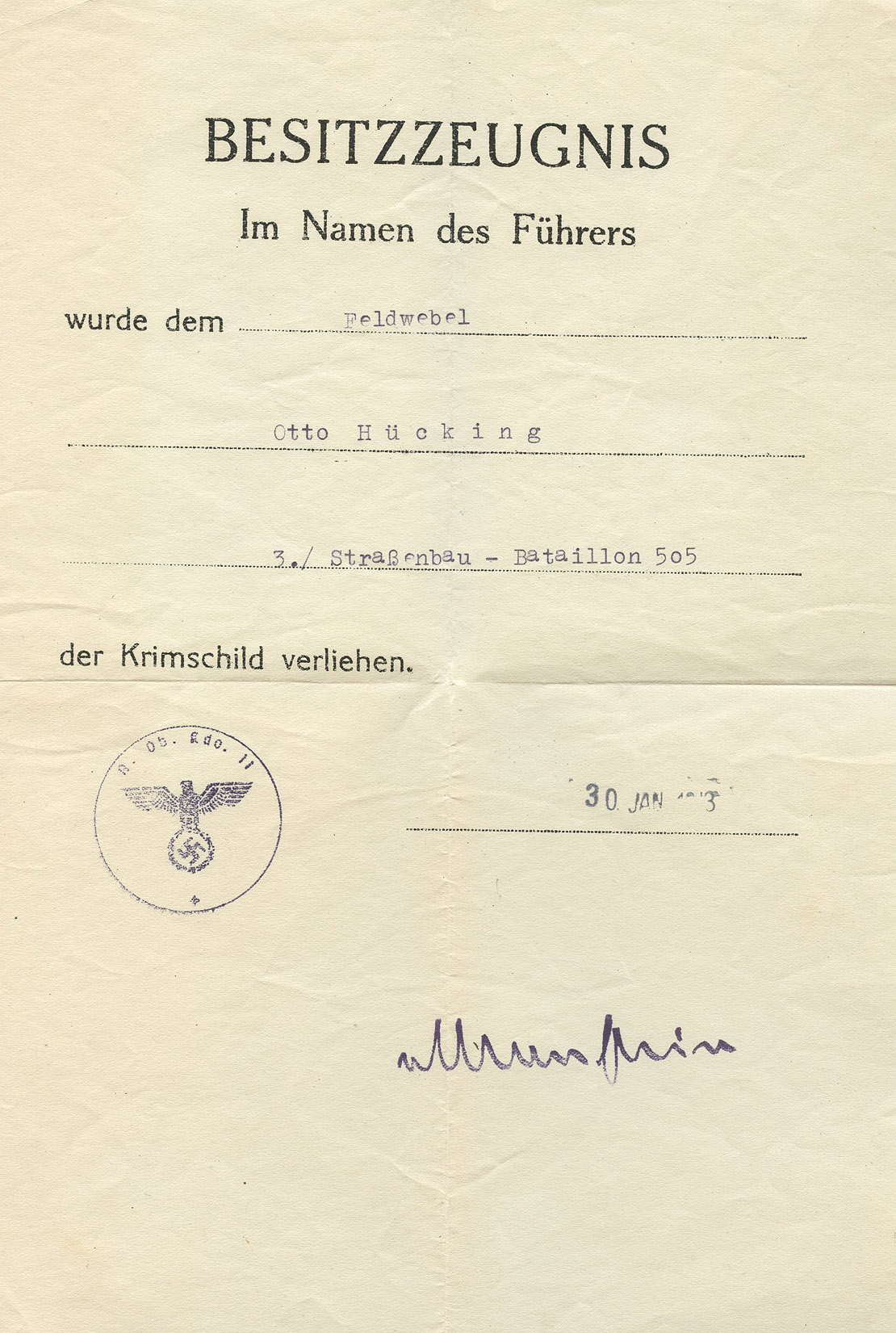
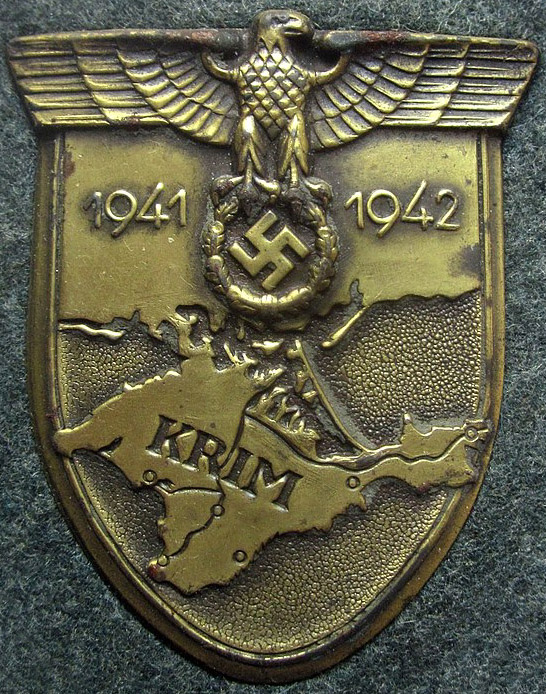

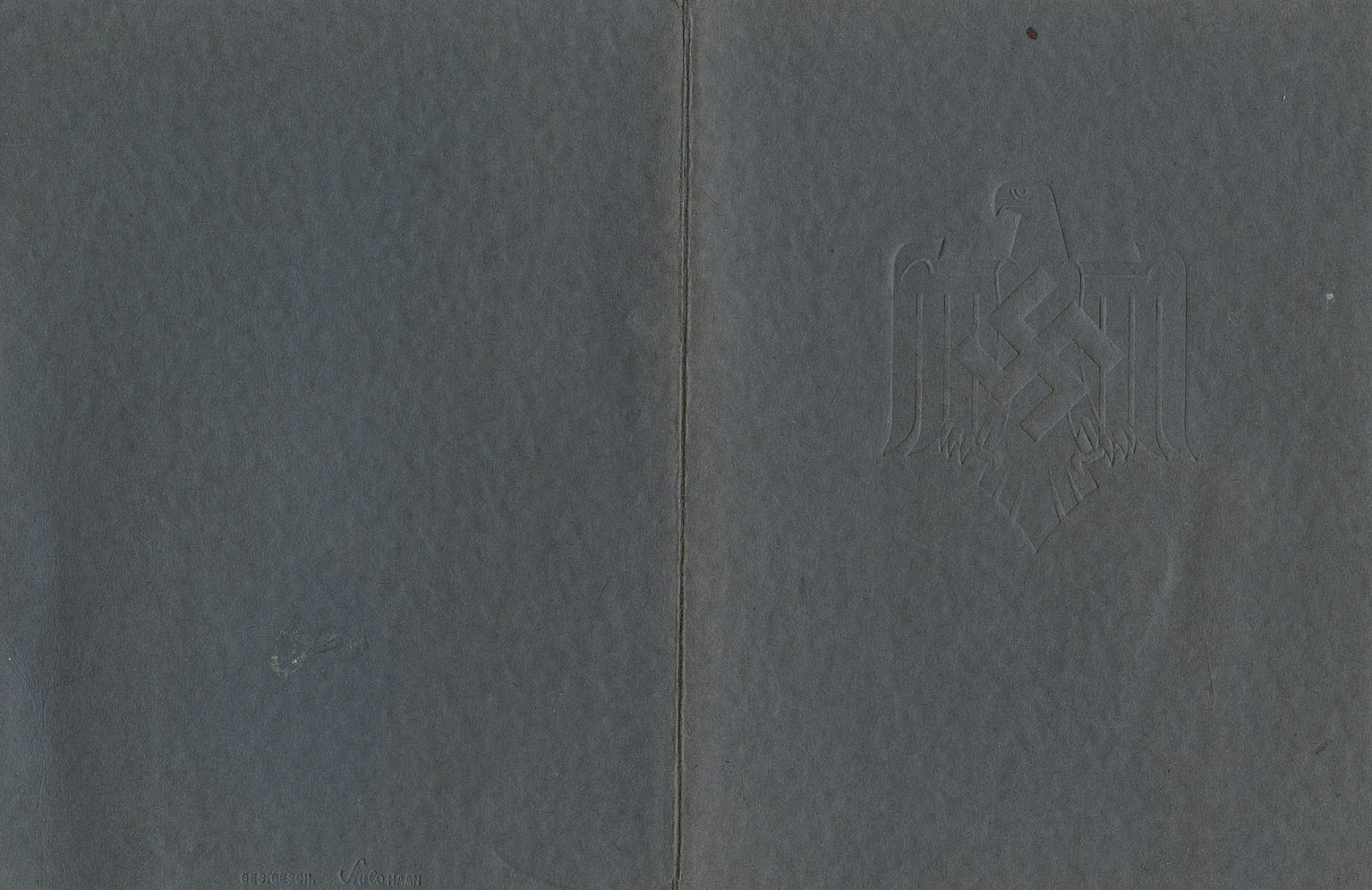


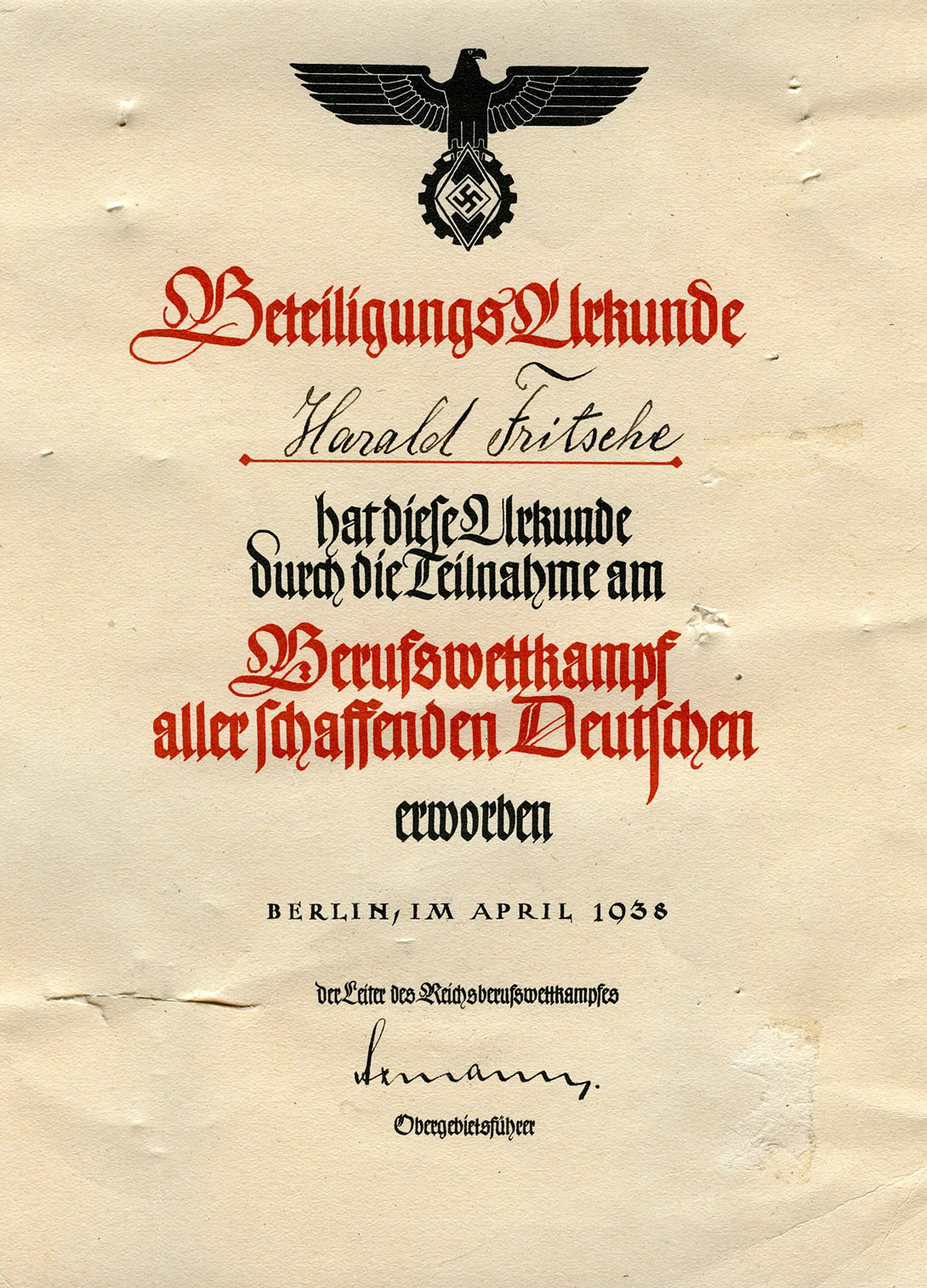

des
Deutschen Volkes
spreche ich
dem Polizeiveterinärrat
Dr. Fritz Hertel,
der dir Altersgrenze erreicht und deshalb in
den Ruhestand tritt, für die dem Deutschen Volke
geleisteten treuen Dienste meinen Dank aus.
Berlin, den 9. Januar 1939
Der Führer und Reichskanzler
Adolf Hitler'
of
[the] German people
I speak
to the Police Veterinary Council
Dr. Fritz Hertel,
who has reached the age limit and is therefore
retiring, for the German people
my thanks for the loyal services rendered to the German people.
Berlin, January 9, 1939
The Führer and Reich Chancellor
Adolf Hitler)

Jugendfest
1934
Bei den Sportlichen Wettkämpfen
am 23. Juni 1934 errand einen Sieg'
Youth Festival
1934
At the sports competitions
on June 23, 1934, the team achieved a victory)]
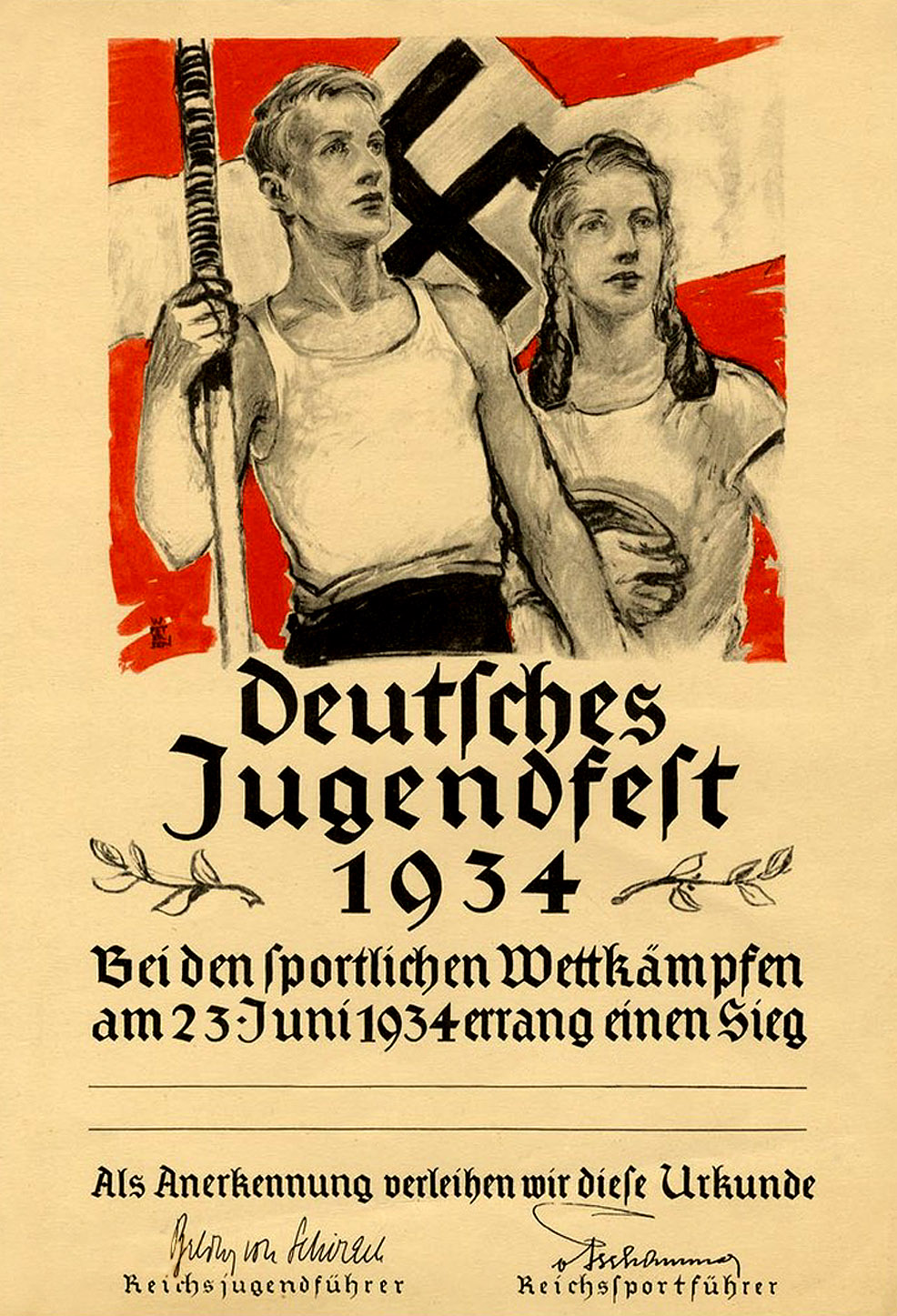

und durch Ihr Verhalten in und außer dem Amt das bei der
Begründung Ihres Beamtenverhältnisses in Sie gesetzte Vertrauen
gerechtfertigt haben, erhalten Sie in der Erwartung, daß Sie auch
fernerhin dem Führer un dem Reiche die Treue halten werden, mit
dieser Urkunde gemäß § 28 des Deutschen Beamtengesetzes die
Eigenschaft als
Beamter auf Lebenszeit
In Vertretung'
and by your conduct both in and out of office, you have
justified the trust placed in you by the establishment of your civil servant relationship
furthermore, in the expectation that you will continue to be loyal to the Führer and the Reich,
pursuant to Paragraph 28 of the German Law on Civil Servants, this document has the
status of
civil servant for life)
Ich ernenne'
I appoint)
Für den Reichspostminister
Der Präsident der Reichspostdirektion'
For the Reich Minister of Posts
The President of the Reichspostdirektion)]
anliegenden Einweisungserlasses übertrage ich Ihnen die
Stelle eines Postschaffners aud Probe bei dem Postamt
Sarstedt mit Wirkung vom 1. März 1937.
Ihr Besoldungsdienstalter in der Besoldungsgruppe A 11
wird nach Ablauf der Probezeit festgesetzt.'
enclosed instruction decree, I assign you the
post of a probationary postmaster at the post office
Sarstedt effective March 1, 1937.
Your seniority in grade A 11
will be determined at the end of the probationary period.)]
Reichspost zum Postschaffner auf Probe angenommen.
Ihre Beschäftigung erfolgt 6 Monate auf Probe.
Sie können jedoch während der Probezeit fristlos entlassen
werden, wenn Sie sich grober Dienstwidrigkeiten schuldig
machen oder sich durch Ihr Verhalten außer dem Amte der
Achtung, die Ihr Beruf erfordert, unwürdig erweisen. Ist
die Probezeit mit Erfolg abgeleistet, so werden Sie auf
Lebenszeit angestellt.'
Reichspost accepted as postmaster on probation.
Your employment will be on a probationary basis for 6 months.
However, you can be dismissed without notice during the probationary period
for being guilty of gross misconduct
or your actions or behavior outside the office
unworthy of the respect that your profession demands. Upon
successful completion of the probationary period, you will be admitted
to employment for life.)]
beizutreten und bei Verrichtung Ihres Dienstes die
vollständige Dienstkleidung zu tragen.
Ihr Besoldungsdienstalter wird nach Ablauf der
Probezeit festgesetzt. Bis dahin erhalten Sie 1500 RM
Grundgehalt und 216 RM Wohnungsgeldzuschuß.
den Gehaltskürzungsverordnungen.'
and, in the performance of your duties,
you shall
wear the full service uniform.
Your grade seniority will be determined after the expiration of the
probationary period. Until then you will receive RM 1500
basic salary and RM 216 housing allowance.
the salary reduction ordinances.)]
weise ich Sie in eine freie Postschaffnerstelle der Gruppe
A 11 der Reichsbesoldungsordnung mit Wirkung vom 1.März
1937 ein.'
I am assigning you to a vacant postmaster position in group
A 11 of the Reich salary scale, effective March 1,
1937.)]
erklärt haben, werden Sie ersucht, sich am 1. März 1937
um, 8.0 Uhr zum Dienstantritt beim Postamt in Sarstedt
zu melden.
Diese Schreiben gilt als Ausweis.'
you are requested to report for duty on March 1, 1937
at 8:00 a.m. for duty at the post office in Sarstedt.
This letter is valid as identification.)]
vom 29.1.1940 (...) ist der Beginn Ihres Besoldungsdienstalters
als Postschaffner in der Besoldungsgruppe
A 10 b mit Wirkung vom 15. Februar 1940 auf den 16. November 1931 vorgerückt worden.'
of January 29, 1940 (...),
the beginning of your seniority in grade A 10 b as a postal clerk
has been advanced to November 16, 1931, effective February 15, 1940.)]
Sie sind gemäß (...) of Zweiten Verordnung zur Durchführung des
Gesetzes zur vorläufigen Regelung der Rechtsverhältnisse der im Dienst des Bundes
stehenden Personen vom 10. Oktober 1950 (...) kraft Verordung mit
Wirkung vom 9. November 1950 in den Dienst der Bundesrepublik Deutschland übernommen.
Sie sind mithin Bundesbeamter auf Lebenszeit..'
You are employed in accordance with (...) of the Second Regulation
for the Implementation of the
Law for the Provisional Regulation of the
Legal Relationships of Persons in the Service of the Federation
of October 10, 1950 (...) you have been taken over
into the service of the Federal Republic of Germany by virtue
of a decree in effect from November 9, 1950.
You are therefore a Federal civil servant for life.)]
